A WHO’s WHO 40th ANNIVERSARY SPECIAL…
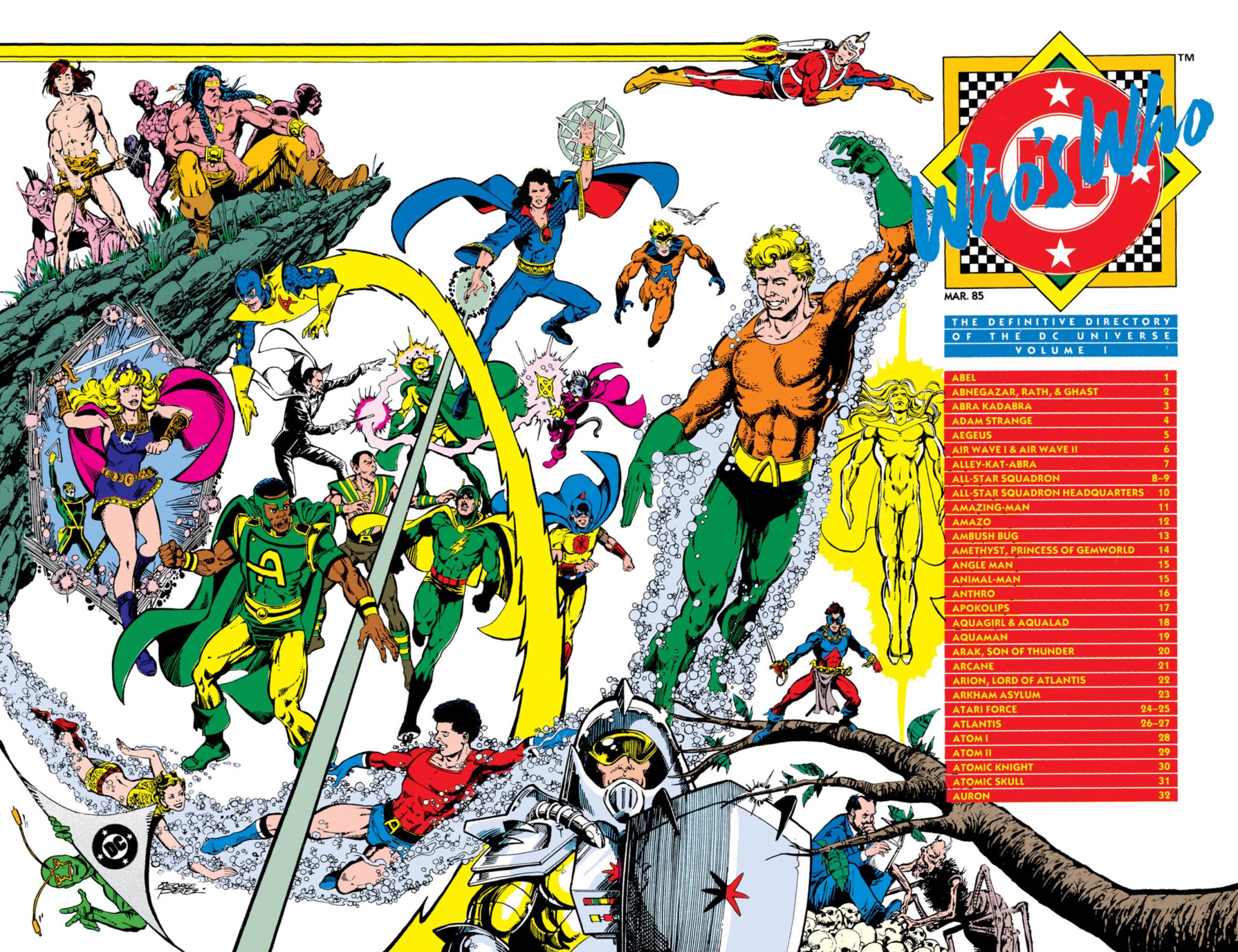
Cover to Who’s Who: The Definitive Directory of the DC Universe Vol. 1 (March 1985) by George Perez
—
It’s the 40th anniversary of Who’s Who: The Definitive Directory of the DC Universe! Volume I was released Nov. 27, 1984, so we’re reprinting a four-part series on the project that we ran in 2021, written by Robert Greenberger, who was deeply involved in the series. (Links below!) But we’re also bringing you this marvelous new piece on Xum’s Who, the cult-favorite, two-issue addendum that was produced by the late Xum Yukinori and his family. It’s probably one of the longest interviews we’ve ever run in one segment, but it is worth every minute of your time. If you don’t have a moment or four right now, bookmark this and come back to it over the holiday weekend. You’ll be very happy you did. It’s not just about comics, it’s about a family’s love and devotion. And what could be better this time of year? — Dan
—
By CHRIS FRANKLIN
DC’s 26-issue maxiseries Who’s Who: The Definitive Directory of the DC Universe (1985-1987) may have been definitive as the title suggests, but by some fans’ estimations, it was by no means complete. Creating an entry for nearly every character, team, important locale and planet from DC’s then 50-year history was a Herculean task, and compromises had to be made. Features that were outside the parameters of DC’s superhero stories were often omitted, as were characters who had fallen out of favor with current editorial regimes. The concurrent Crisis on Infinite Earths series even affected the entries of two thirds of DC’s Trinity, leaving the “Earth-One” versions of Superman and Wonder Woman without listings, as Who’s Who rolled on past the universe-rebooting effects of that event.
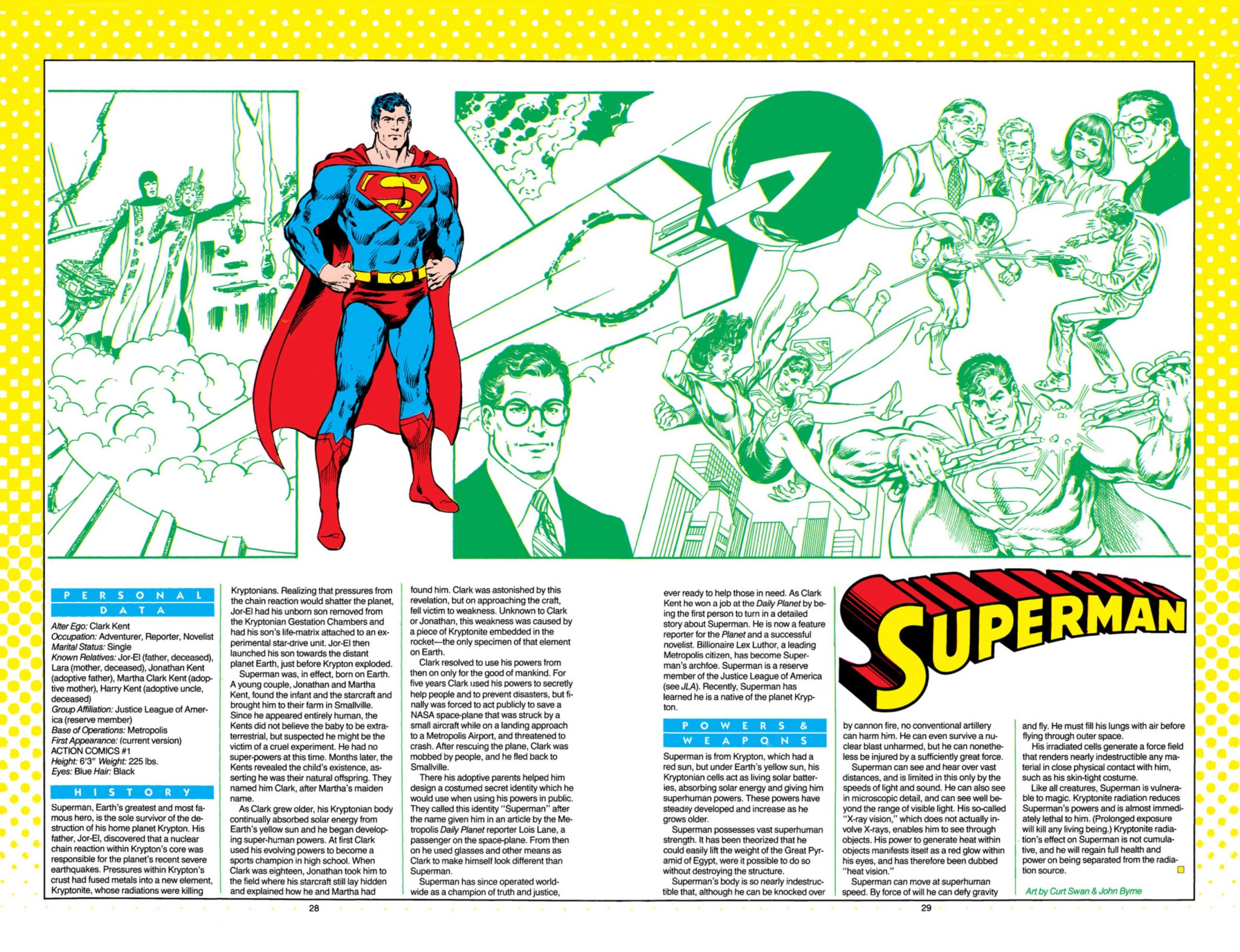 It would take a talented illustrator, designer and writer to finally right those wrongs. Xum Yukinori had been contributing to Comic Book Resources’ “The Line It Is Drawn” feature for some time before submitting his design for a “lost” Who’s Who entry of his own creation, Kid Lantern, proposed sidekick to Green Lantern. Readers taken with Xum’s exact recreation of the Who’s Who format pointed him toward Who’s Who – The Definitive Podcast of the DC Universe by Rob Kelly and The Irredeemable Shag. After listening to the podcast series, Xum began crafting pitch-perfect entries that looked as if they were found in a long-forgotten drawer in the DC offices and sending them into the show for Rob and Shag to share. So convincing was Xum’s work, many listeners thought their vintage copies of Who’s Who were missing the pages featuring these amazing pieces of work.
It would take a talented illustrator, designer and writer to finally right those wrongs. Xum Yukinori had been contributing to Comic Book Resources’ “The Line It Is Drawn” feature for some time before submitting his design for a “lost” Who’s Who entry of his own creation, Kid Lantern, proposed sidekick to Green Lantern. Readers taken with Xum’s exact recreation of the Who’s Who format pointed him toward Who’s Who – The Definitive Podcast of the DC Universe by Rob Kelly and The Irredeemable Shag. After listening to the podcast series, Xum began crafting pitch-perfect entries that looked as if they were found in a long-forgotten drawer in the DC offices and sending them into the show for Rob and Shag to share. So convincing was Xum’s work, many listeners thought their vintage copies of Who’s Who were missing the pages featuring these amazing pieces of work.
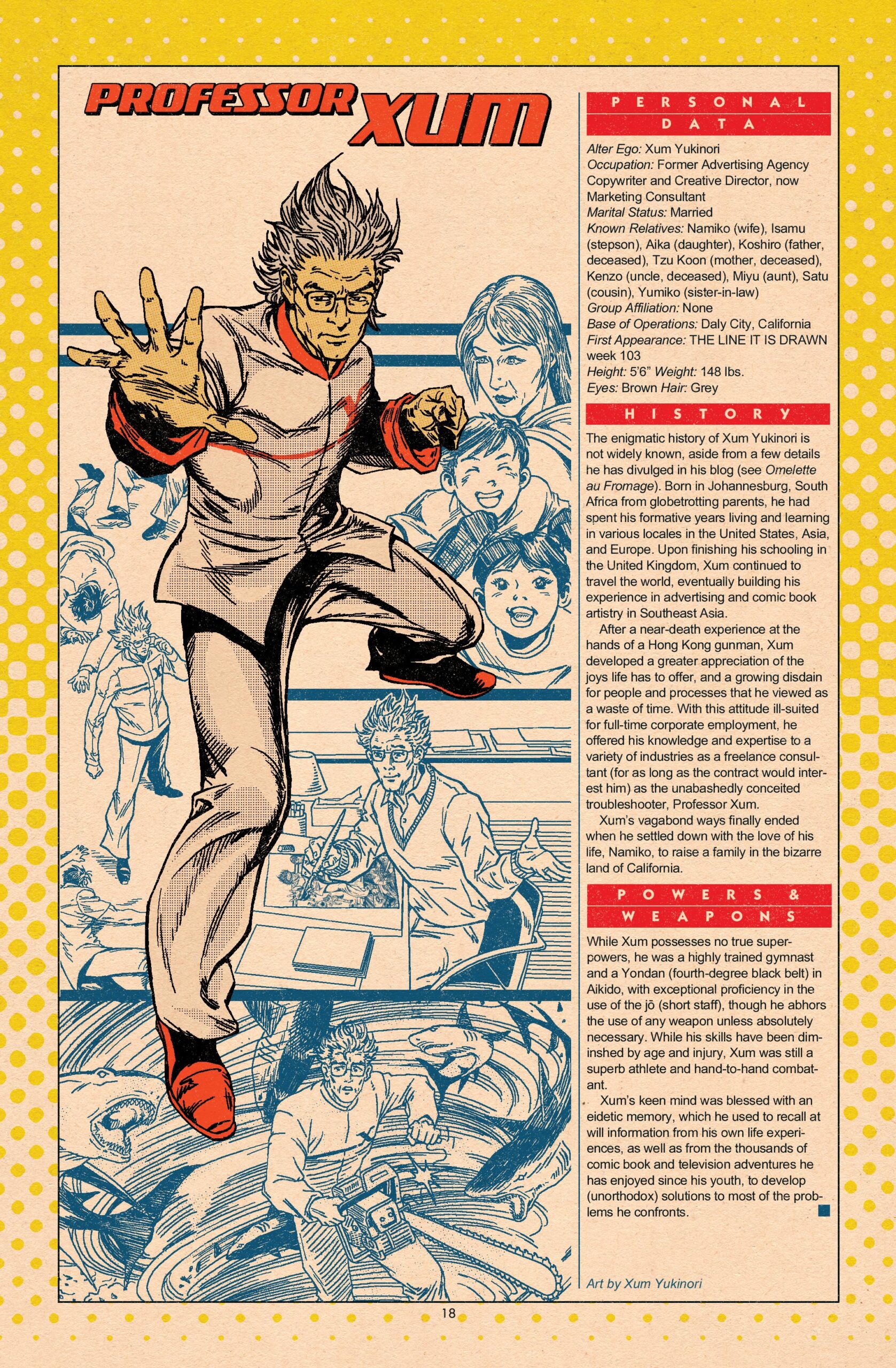
With the help of his family and friends, Xum compiled these entries in a printed comic, Xum’s Who: Xum Yukinori’s Addendum to the Definitive Directory of the DC Universe, Volume I. Wrapped in a cover brimming with these lost characters springing from Xum’s own drawing board, the comic collected all the entries Xum had shared via the podcast, and his contributions to “The Line It Is Drawn.”

Xum continued to contribute to CBR and create Xum’s Who entries as he joined the Fire and Water Podcast Network, founded by Rob and Shag, Ryan Daly, Siskoid, my wife Cindy and myself. On his Done-In-One Wonders Podcast Wonder Show, Xum covered somewhat obscure comics in a way unique to him, co-hosting the series with several DC characters left homeless after the events of Crisis on Infinite Earths.
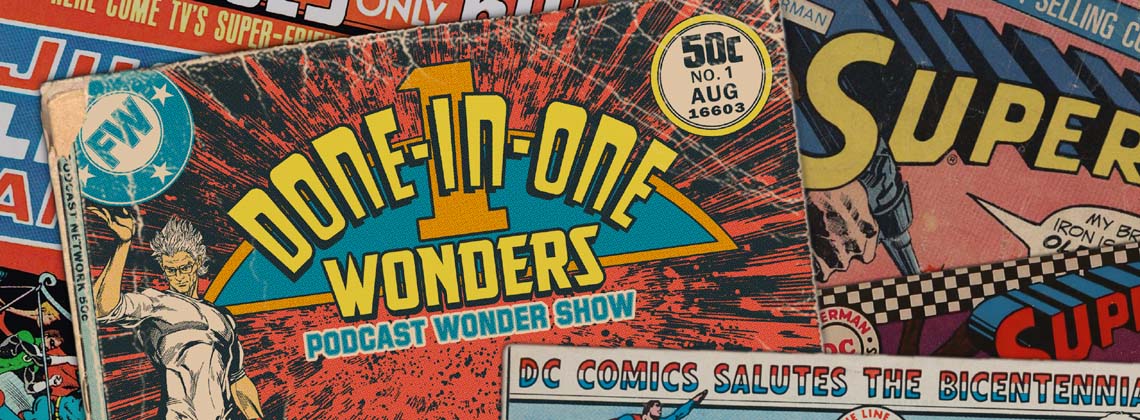
Xum’s life was tragically cut short by a series of health issues. Though his family, friends, listeners and readers mourned him, he continued to dazzle them with his creativity from the other side of the Source Wall. Xum’s wife Namiko, son Isamu and friend Adrian Zet published Does This Trade Dress Make Me Look Phat, a book collecting artwork created by Xum primarily for “The Line It Is Drawn” feature. They also continued ahead with his plans for Xum’s Who Volume II. Taking the entries Xum had created and partially finished, and combining those with new text, art and design, they recently released the second volume, full of more characters and concepts too good to leave in limbo.
I corresponded with Namiko and Isamu to learn how the Yukinoris and friends crafted this tribute to DC’s storied history, and to their late loved one.
—
Chris: So how did Xum’s Who come about? It all started with a character based on you Isamu, correct?
Isamu: Yes. Though I was only… 8? 7?
Namiko: 7.
Isamu: 7 at the time Dad drew it. So, he was picturing me at age 16 as “Kid Lantern,” a made-up sidekick to Green Lantern. And of course, I looked nothing like this when I did reach age 16. My head was bigger, and my body was smaller. Well, skinnier. Definitely not as muscular. I did have a Green Lantern ring though – a metal one I bought at a comic show. I’ve been a fan of GL since I watched the 2011 animated series.
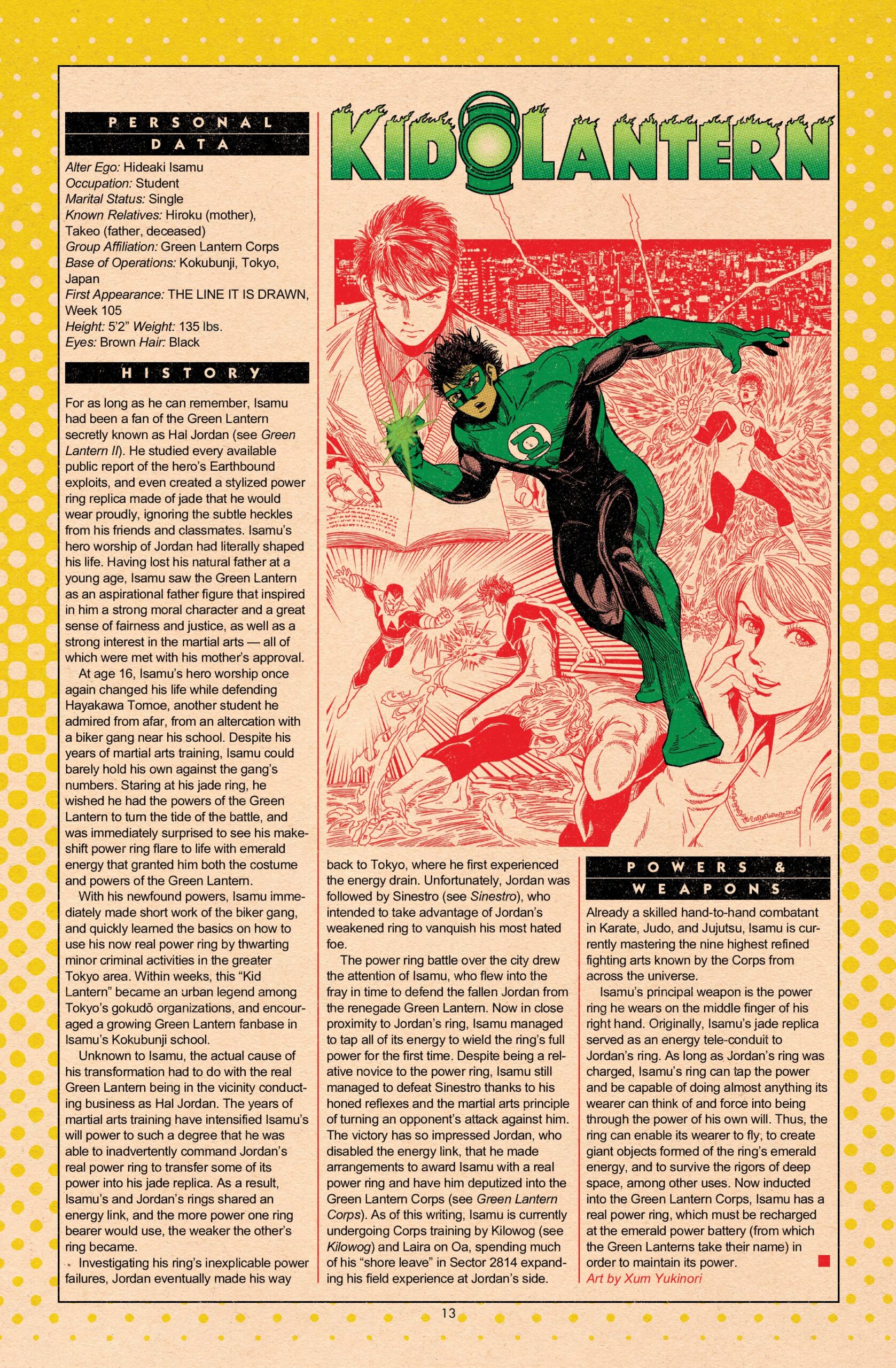
Namiko: Xum originally drew this for an informal “create a sidekick” contest on one of the comic book forums he was part of back then. He decided to submit his contest entry as a DC Comics Who’s Who page so he could explain who “Kid Lantern” was and his origin and all that. He won second place. He later retooled the artwork as a submission for “The Line It Is Drawn” a year or so later, and that’s when everything started to take off. Someone on Facebook complimented Xum on the entry and asked if he was listening to the Who’s Who Podcast, which he had never heard of. Xum was a long-time DC Comics reader, and obviously loved the Who’s Who series, so he listened to the podcast, and he immediately became a fan. I remember him telling me that the voices and banter of Rob Kelly and Shag Matthews reminded him of the Adam Carrola and Dr. Drew radio shows, except they were talking about geeky stuff.
Anyway, the Who’s Who Podcast inspired Xum to create a “Superman of Earth-One” entry based on the character from the 1960s and 1970s, which the actual Who’s Who comic didn’t do. They did the version of Superman from the 1940s and the one from the 1980s.
Isamu: Earth Two and post-Crisis versions.
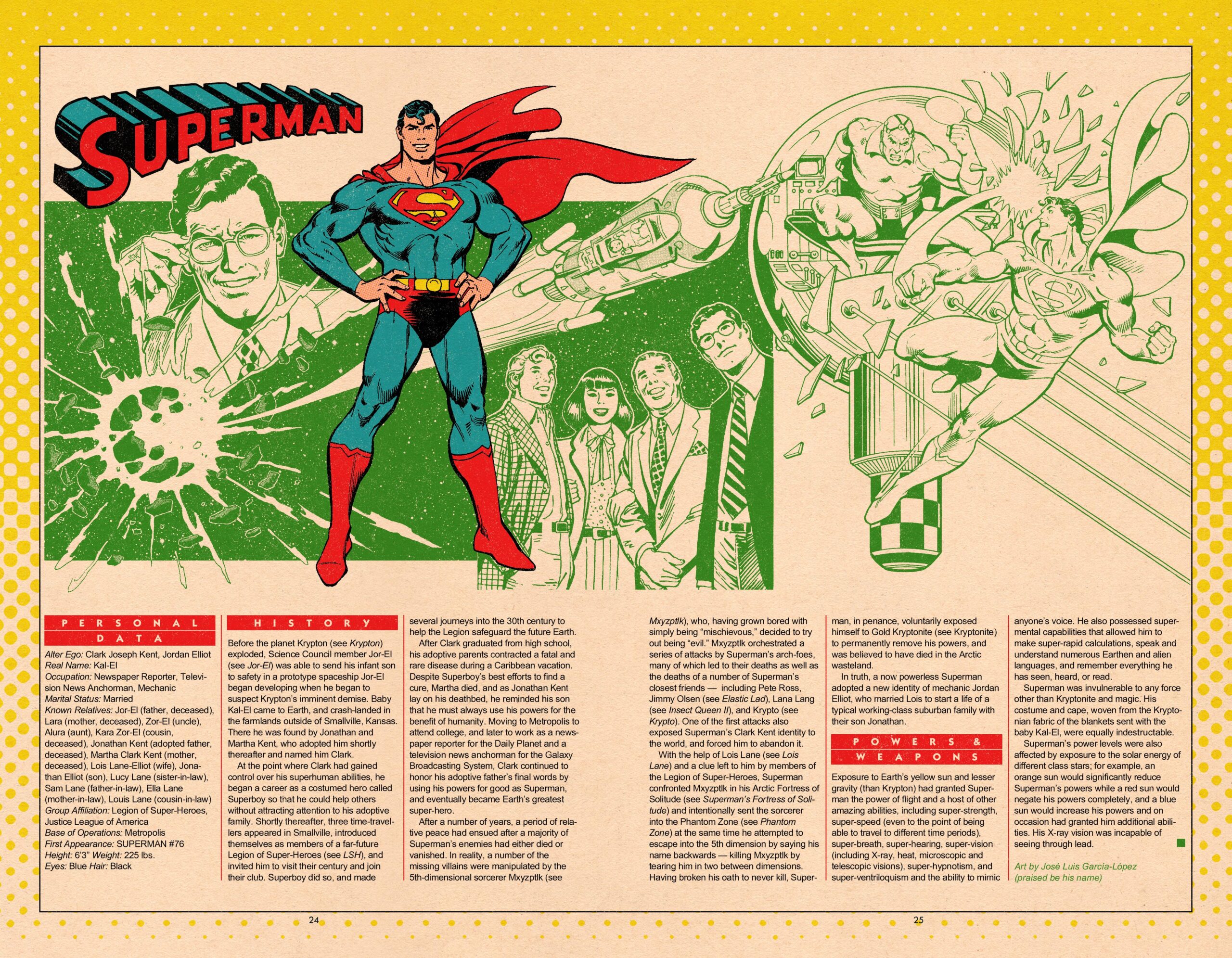
Namiko: Right. Xum stripped together the entry using art from a DC Comics licensing guide he owned and wrote all of the text. It was the first Who’s Who entry he created featuring an actual DC Comics character, since “Kid Lantern” was made up. He then did a similar one for “Wonder Woman of Earth-One” next, which DC’s Who’s Who also skipped over. That entry inspired him to create one for Wonder Woman’s sister Nubia. And the entries kept going from there.
Chris: The Superman and Wonder Woman of Earth-One entries were two standouts for me, righting wrongs that many fans had lamented since 1986!
Namiko: That was how Xum put it too: putting right that which was wrong. You can tell he watched a lot of Quantum Leap.
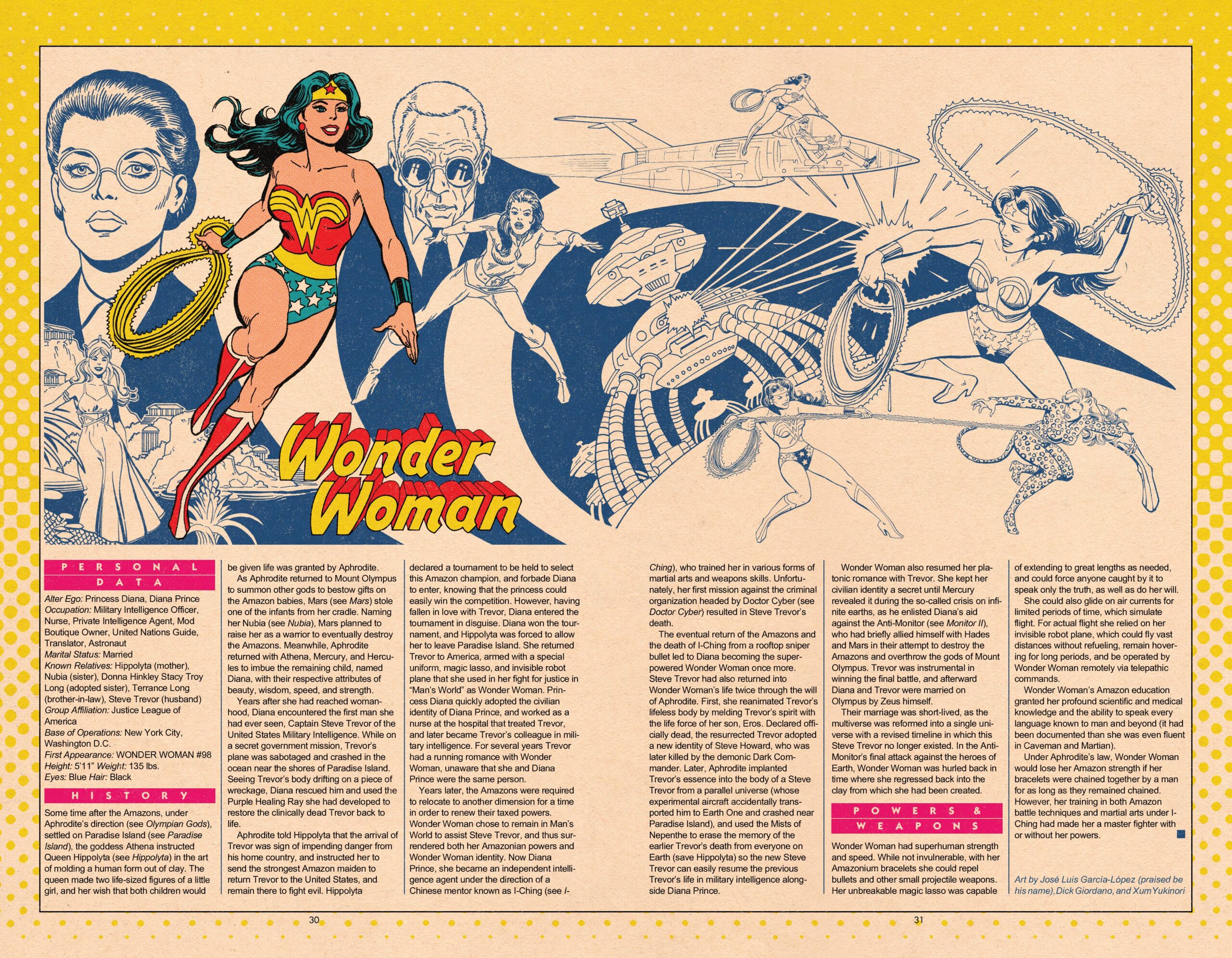
Isamu: Even so, Dad’s use of Alan Moore’s “Whatever Happened to the Man of Tomorrow” story (from Superman #423 and Action Comics #583) as the conclusion of Superman’s History section was a point of contention among Superman fans who do not consider that story pre-Crisis canon. Dad received a lot of notes about it back then and we keep getting occasional comments on Dad’s old blog about it now.
Namiko: But back to your earlier question. Xum enjoyed making those mock Who’s Who entries and continued to create more of them off and on. Some were to help explain more made-up characters created for The Line It Is Drawn, like Steampunk and a 1940s version of Firestorm. Some people commissioned Xum to put together a few entries on overlooked DC characters like Domino. And then Xum drew that mock Who’s Who cover for “The Line,” which was when he decided to create a whole 32-page book.
Chris: With so many potential overlooked characters, how was the list created on who would be featured in each issue?
Namiko: Xum created the Volume I list when he put together that mock cover for “The Line.” He had already created 12 entries by that time, so that started the list. He also had a short list of characters he wanted to make entries for. Some were characters he felt should have had an entry in the original run of Who’s Who, like Woozy Winks and Fireman Farrell. Others were inspired by the podcasts he was listening to, like when Rob and Shag talked about Lady Cop or the Human Flying Fish. For the mock cover, Xum needed to create an index list that filled 32 pages, and he was seven pages short, so he quickly filled the spaces with goofy DC characters he liked, like the Breakaway Bandit, Master Villain, Lady Viper… I don’t remember which ones were the other last-minute additions…
Isamu: Me neither, but even after he made the cover Dad kept coming up with ideas of more characters to do. Like Professor Ojo. The Bronze Tiger entry had a note to “see Professor Ojo,” but the character didn’t have an entry when the series reached the P characters. Dad noticed a few other such references to other character entries that Who’s Who didn’t publish. So, it’s no surprise that Dad started compiling a character list for Xum’s Who Volume II, because he was already committed to the list he put together for the mock cover for Volume I.
Dad eventually had a list of characters for Volume II all worked out before he finished Volume I. And then, after Volume I was finished and he started working on those Volume II entries, Dad remembered Ace the Bathound, Bulletman and Bulletgirl, Ibis the Invincible, Prez, Percival Pop the Super Cop, the Holiday Girls, and the Whirlybat vehicle. So, he started building a “Volume III” list of entries he wanted to do. And Dad was writing the text for Volume II and III entries pretty much around the same time. He never followed a particular order. He would just work on whatever character he was in the mood to write about.
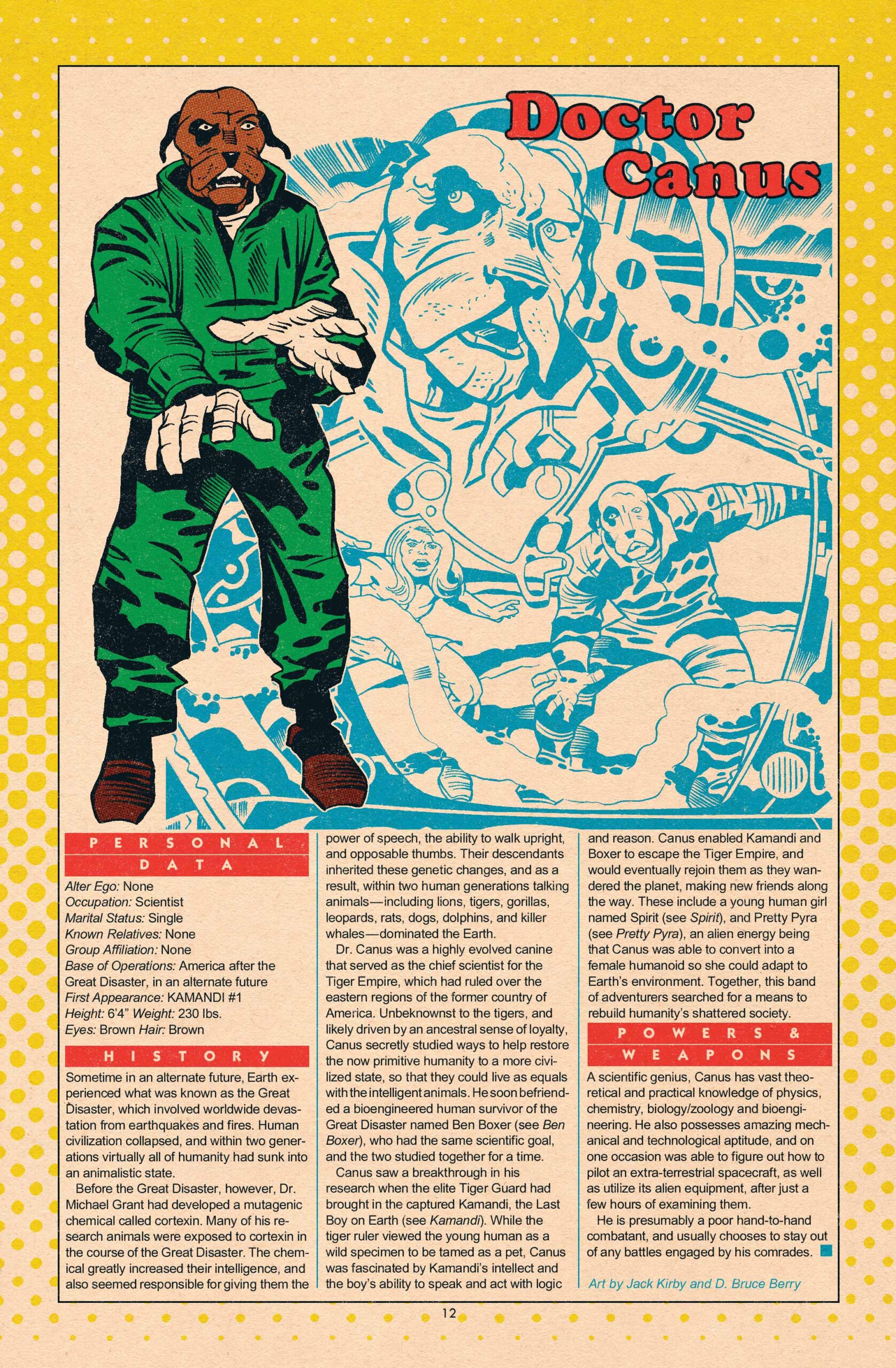
As a result, not every character Dad originally planned for Volume II had been written up by the time he was unable to continue working on it. So when I decided to take Dad’s unfinished work to put together Volume II, I took the unwritten characters out and started putting some of Dad’s written Volume III entries in, like Ace the Bat-Hound, as well as new entries I had put together myself for fun, like the Sino-Supermen, Human Cannonball and Doctor Canus – all were triggered by a comment made on a Fire and Water podcast that said, “[Character name] should have gotten a Who’s Who page,” and my response of, “Yes, yes they should.” I also had entries put together by Uncle Rob and Uncle Siskoid as well. So, the plan for the second volume came together fairly quickly.
Of course, putting these pages in Xum’s Who Volume II led to my having to come up with last-minute ideas for additional entries myself. One of the Volume II pages that Dad had written, penciled, and arranged the art for was a split page featuring 2-D Man and Air Wave 1.5, and Ace the Bat-Hound goes right between those entries alphabetically. So, I had to quickly find two DC Comics characters published before 1986, one with a name between 2-D and Ace and one between Ace and Anti-Lad, that I could create half-page entries for. This led to the addition of 711 and the Adjudicator, which were the characters I found to be the most interesting to me. I also had to take out Dad’s already written entry for Blinky, Winky and Noddy because the new Ace page knocked the two-page Dingbats of Danger Street entry off of a page spread. It was a bit of a juggling act, and a few other entries Dad had written for Volume II, like the Ringmaster and the Superman Revenge Squad, had to be taken off the list as well.
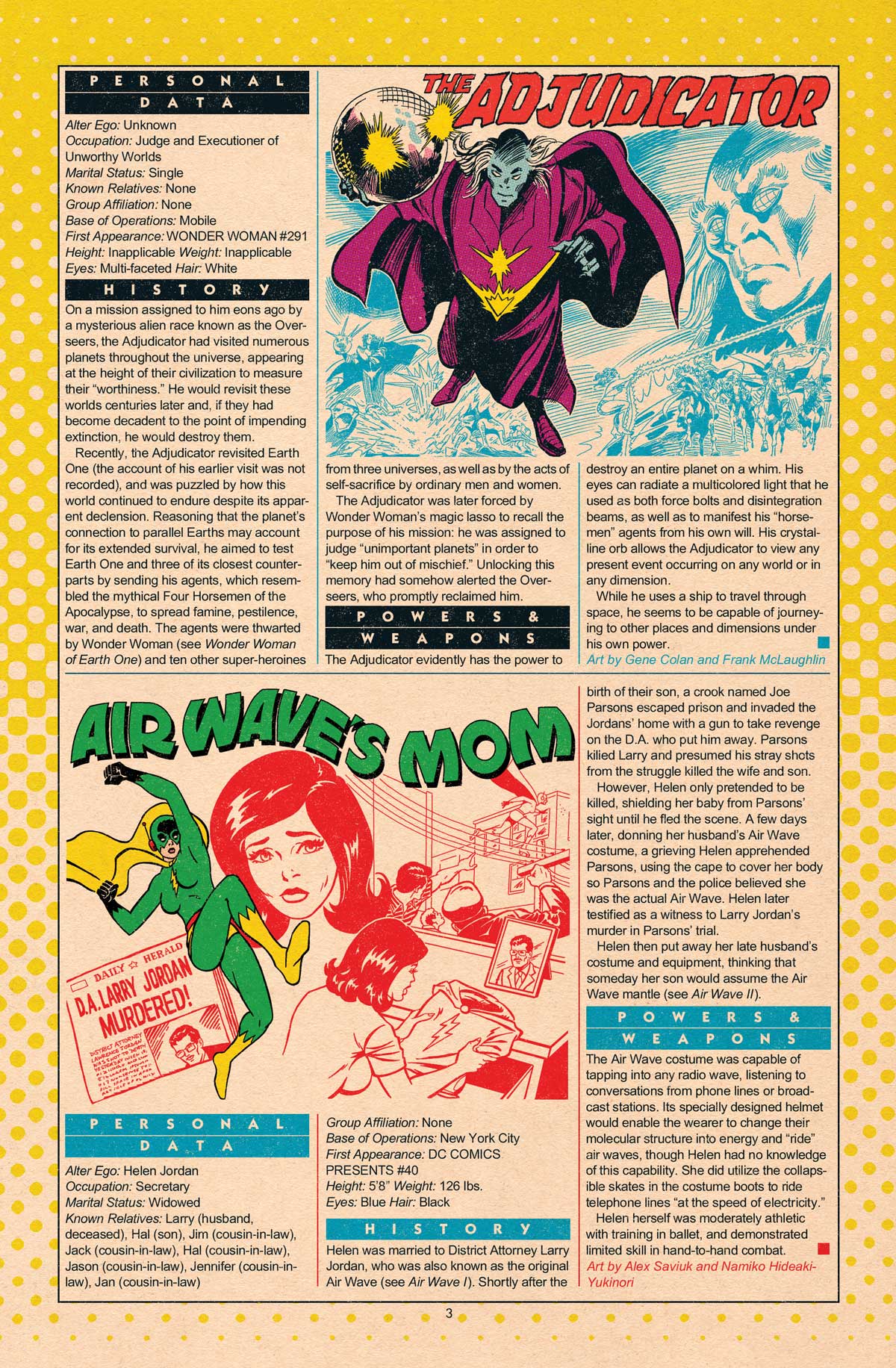
Namiko: I’m sure he wouldn’t have minded. Xum was very happy to see other people inspired by his work to make their own Who’s Who entries, so I know he would have been proud to include entries made by Rob, Siskoid, and his son.
Chris: Can you describe the process of how a Xum’s Who entry is created?
Isamu: Once dad perfected the entry templates in Photoshop, the process was essentially “writing first, artwork second.” The Personal Data, History, and Powers & Weapons sections are completely typed out, and then the copy is edited and “Brenda Pope proofread,” as Dad called it, to make it as brief and error-free as possible. (Chris: Brenda Pope was the original proofreader on DC’s Who’s Who series) Then the copy is loaded into the template and laid out to provide the maximum space for the artwork, whether it be a two-column-wide vertical space or a three-column-wide horizontal one. Sometimes the copy needed to be edited down a bit to keep a line or two of text from spilling into the space for the art. The final copy gets another “Brenda Pope proofread” to make any final corrections and edits so the final copy still fits in its designated space.
In the art step, Dad either illustrated it himself – which means he penciled the art on drawing paper, scanned it, and did the inks and colors digitally in Photoshop using his Wacom tablet – or he pieced together a collage of lightly scanned comic book art in Photoshop, and “digitally inked” it on his Wacom so it would have a cohesive look. I cannot draw as good as Dad, or Mom for that matter, but I am really good at tracing and touching up the black lines of scanned art using Dad’s Wacom. So, I create my collages by tracing scans of my Dad’s comic book pages or touching up panels from a screenshot of a digital release.
Chris: Tell us about the cover to Volume I.
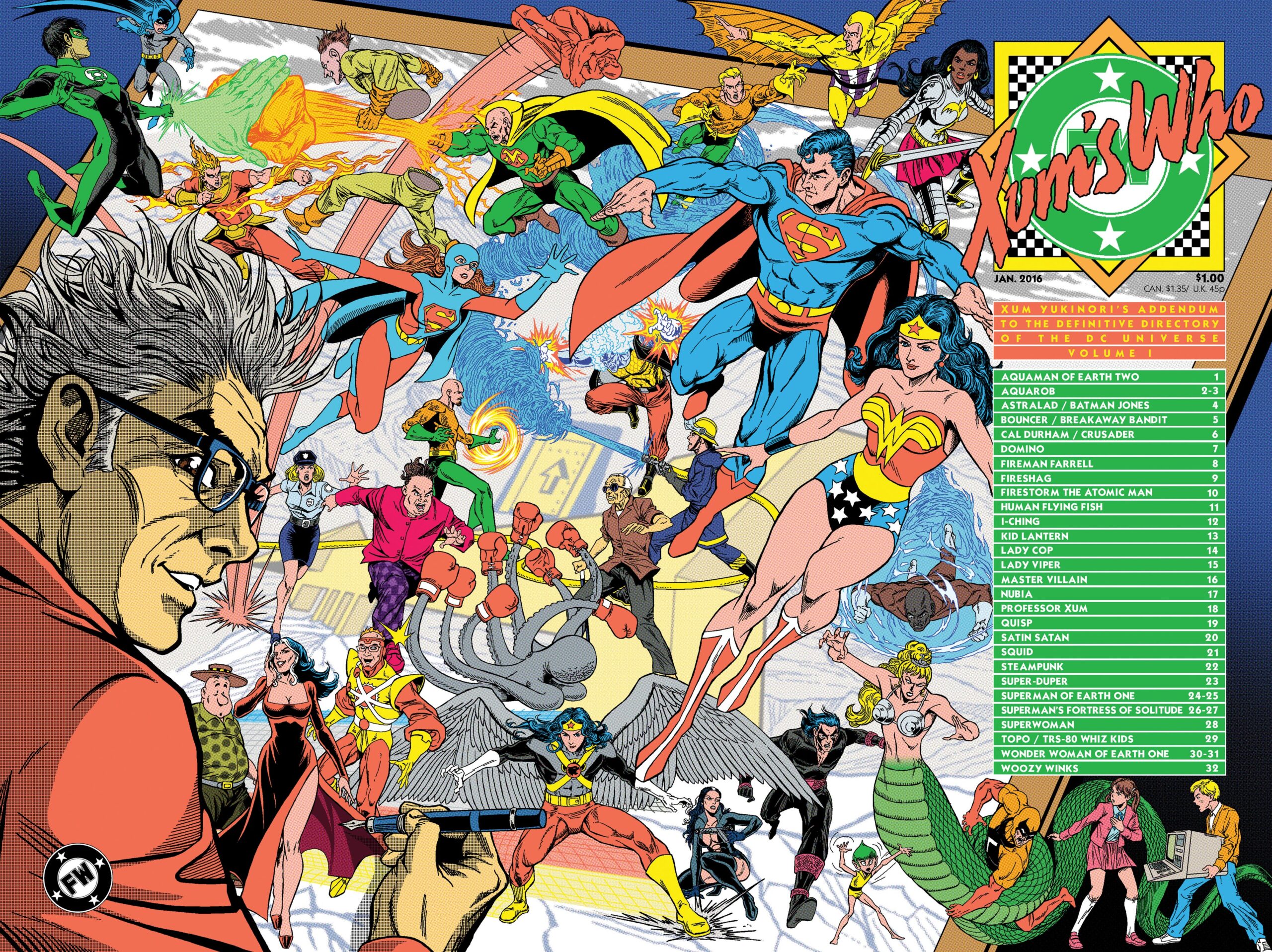
Cover to Xum’s Who Vol. I by Xum Yukinori
Namiko: Xum drew it over the holiday break in 2015 originally as an art piece for “The Line It Is Drawn” (the feature published on January 8, 2016). The theme asked for suggestions for comic book-related New Year’s resolutions, and the Twitter suggestion Xum picked was by someone using the handle, “TheRealAstrozac,” who wrote, “Professor Xum will not draw DC covers for an entire year.” So naturally, Xum’s response was to draw a DC cover teeming with DC characters, since he had an extra week of drawing time, to jokingly admit that he broke his resolution straightaway. And in his mind, the Who’s Who covers illustrated by George Pérez were the perfect example of such a cover.
As we explained in your earlier question about the character lists, Xum wanted to include the characters he had already made mock Who’s Who entries for plus other characters he wanted to feature in the future, including those he had to quickly decide. After the piece was published, Xum half-jokingly said on many occasions that his initial entries he created to “right the wrongs” with the Earth-One Superman and Wonder Woman had evolved into “a mad plan” to complete this 32-page volume, now that his mock-cover essentially put that commitment in writing.
This cover was also when Xum first came up with “Xum’s Who” as the name for this project, putting his name in the title logo. He called it the ultimate conceit, but people would definitely know who was behind it.
Chris: In addition to Kid Lantern, in the first volume Xum included some direct nods to your family, as well as the Fire and Water Podcast Network. What can you tell us about those?

Namiko: Xum made these entries before he made the mock cover drawing that laid out his plan to create a full book. FireShag was created first. It was part of a congratulatory gift from Xum to the hosts of the Who’s Who podcast for completing their coverage of the first 26-volume maxiseries, as well as to thank them for the hours of entertainment their podcast provided to him. Xum made an entry featuring the Golden Age Aquaman for Rob Kelly and offered to create a “FireShag” entry for Shag Matthews if Shag was willing to write the History section, since Shag was the expert on his own life. Shag joked on the podcast that he was incapable of writing his own history for a Who’s Who page, which prompted another podcaster named Michael Bailey (from the Fortress of Baileytude Podcast Network) to write one for him, which Xum then used. Shag provided the Personal Data, and Xum wrote the Powers & Weapons section. All three contributors had their tongues firmly planted in their cheeks.
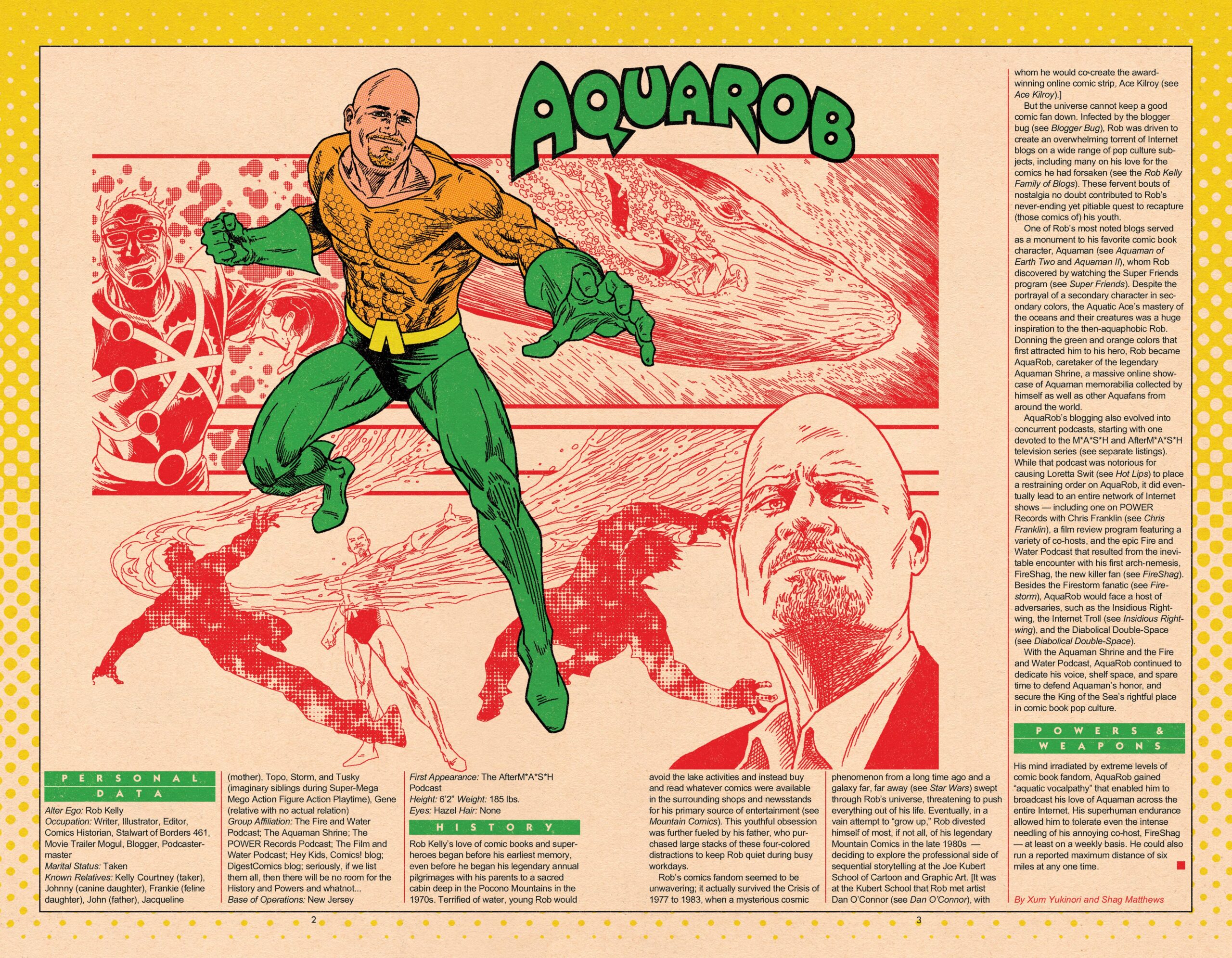
Shortly afterwards, Shag and Xum emailed back and forth to create an “AquaRob” entry for Rob Kelly, and they had a very lengthy phone call to go over the details to include. The call was so lengthy that AquaRob ended up having a two-page entry, which probably irked Mr. Matthews a bit. Xum made it up to Shag by creating an entry for a Firestorm villain called the Satin Satan, as if Xum needed a reason to draw pictures of a sexy woman in a slinky, low-cut dress…
The “Professor Xum” entry was created for “The Line” when Xum was 52 years old, which was the year of what he called “The Xum 52,” a challenge he made to himself to submit artwork to “The Line” every week for an entire year (he had missed a few weeks on occasion in past years). Xum would also draw a cameo portrait of himself in each of the art pieces he submitted, which he jokingly called a “safeguard” to make it hard for people to steal his art online, as well as an “experiment” to see how long website viewers would put up with his self-insertions before they started to complain.
During the week he created a mock Who’s Who entry for that made-up character I mentioned called Steampunk, he created a mock entry of himself as “Professor Xum” for the cameo, placing both entries side-by-side in a mock two-page spread. Xum repurposed other cameo drawings of himself from past Line pieces for most of the entry, adding a cartoony drawing of myself, Isamu, and our daughter Aika. Everything Xum wrote in that entry was completely true, so the cameo also served as a way for people who only knew Xum from his artwork to get to know him a little better as a person.
Chris: I was also happy to see Superman’s Fortress of Solitude, which many other Who’s Who entries directly referenced, but was completely dropped from the series!
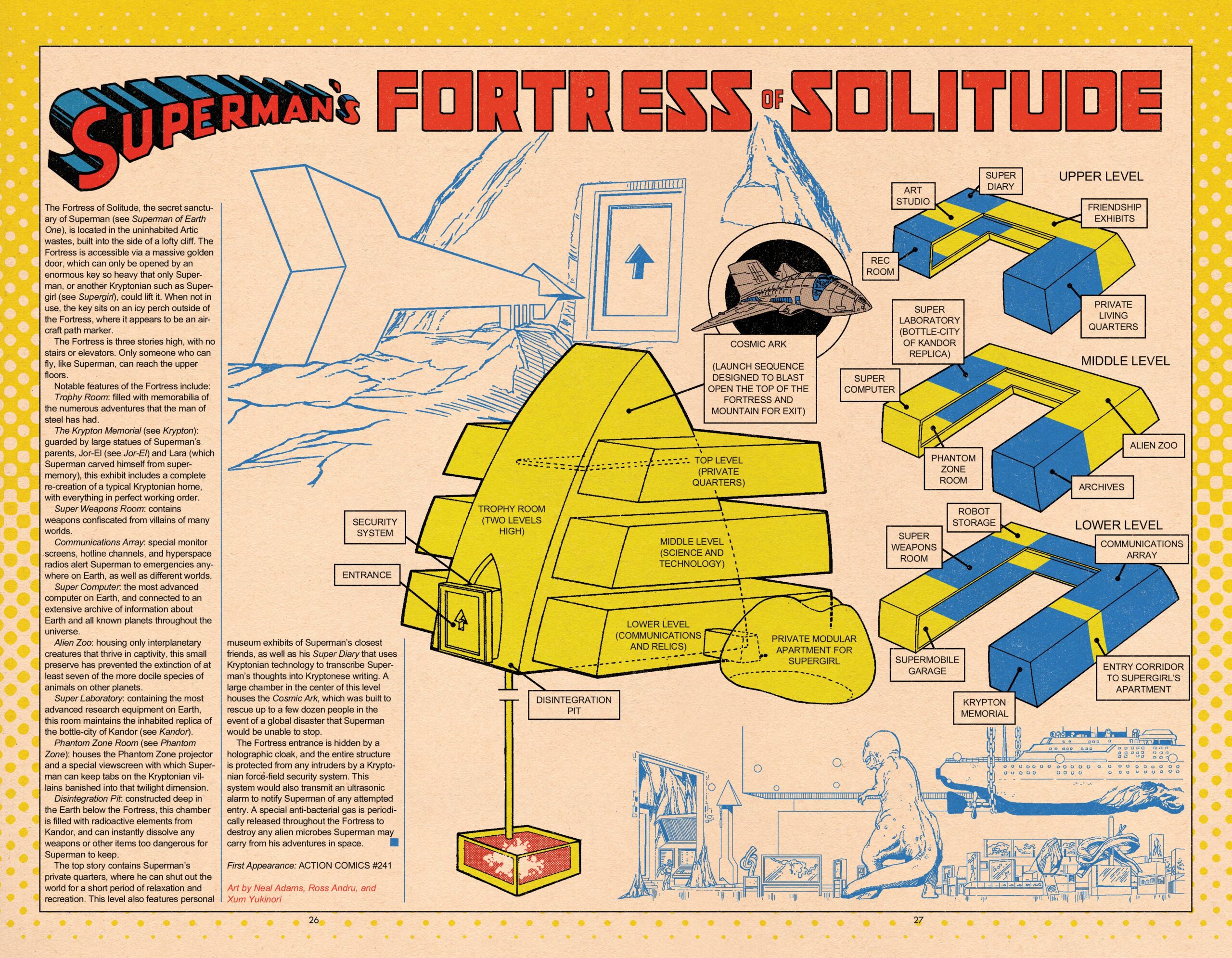
Isamu: That was another “wrong to right” in Dad’s point of view. Dad touched up scans of Neal Adams’ original schematics from a Superman-Flash race treasury comic, which did not include details on the top floor of the Fortress, probably due to lack of available space. Dad then had to work out the top-level map based on a later treasury comic that was specifically about the Fortress. It was one case where Dad had to collage artwork from two different artists. Uncle Adrian (Zet) took Dad’s printed copy of Xum’s Who to a comic convention and showed this entry to Neal Adams himself, who autographed one of the pages of the spread.
Chris: Some of the entries were drawn in Xum’s own unique style, like Lady Cop. Did he have a desire to balance out using sourced comic art versus original drawings?
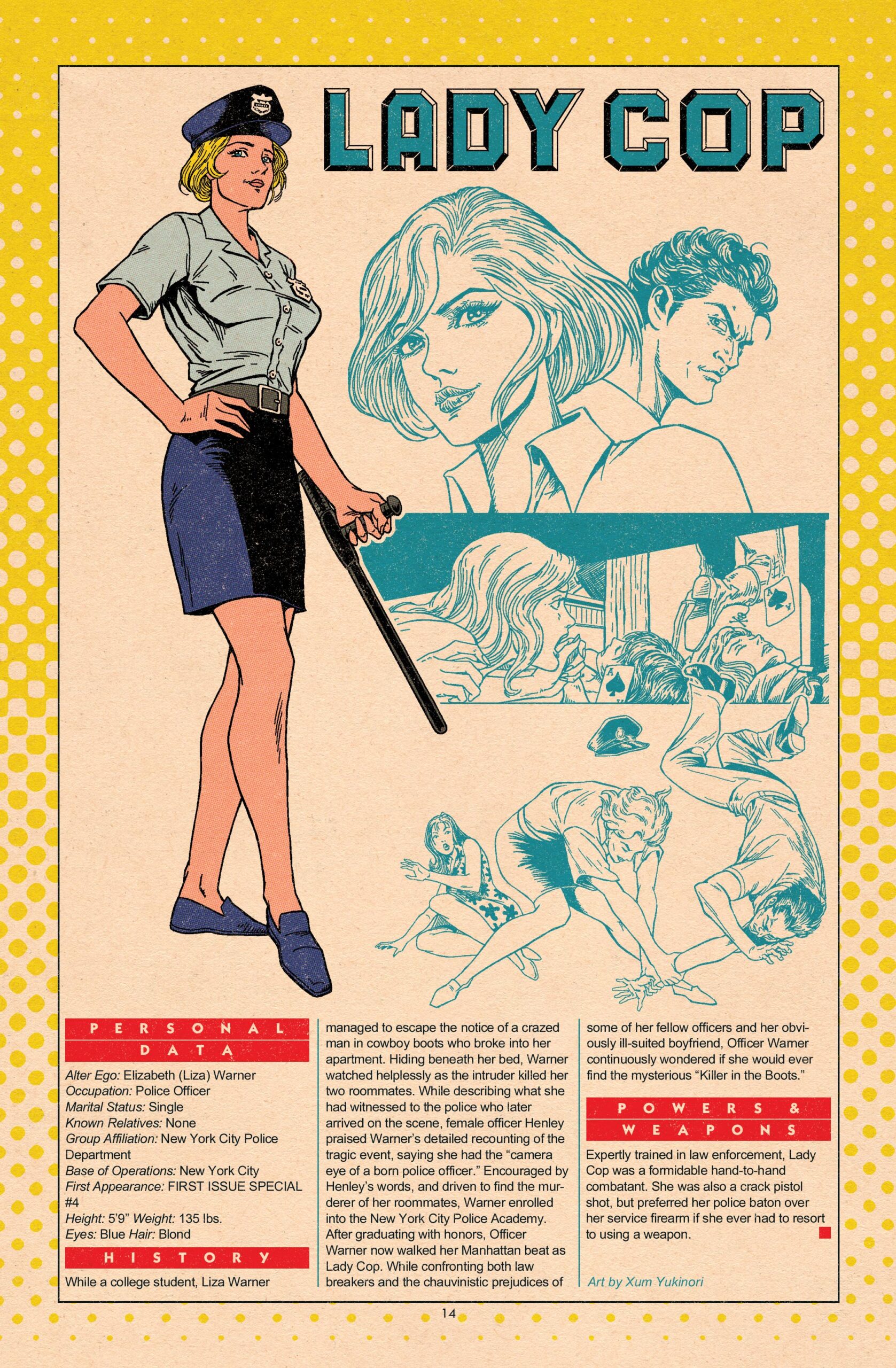
Namiko: Very much so. Xum once described the Who’s Who series to me as a “historic artbook” of DC Comics, which not only showcased 50 years of characters but the plethora of artists who created and depicted them. He wanted his Xum’s Who project to capture that same artistic variety, which could not be done if he drew every single entry.
Isamu: Dad tried to follow what the original Who’s Who series did and use comic panels drawn from a single artist who was most associated with the character whenever he could, like Don Heck for Nubia, or Dan Spiegle for Domino.
Namiko: I cannot tell you all of the reasons behind him choosing which characters would use sourced art and which ones he’d draw himself, but I do know that for some characters Xum couldn’t find enough comic book panels to work from.
Chris: Another drawn in Xum’s style was the forgotten Batman villain, the Squid. As a kid who grew up on the Gerry Conway/Don Newton/Gene Colan era of the Batman titles, I was tickled to see this guy!
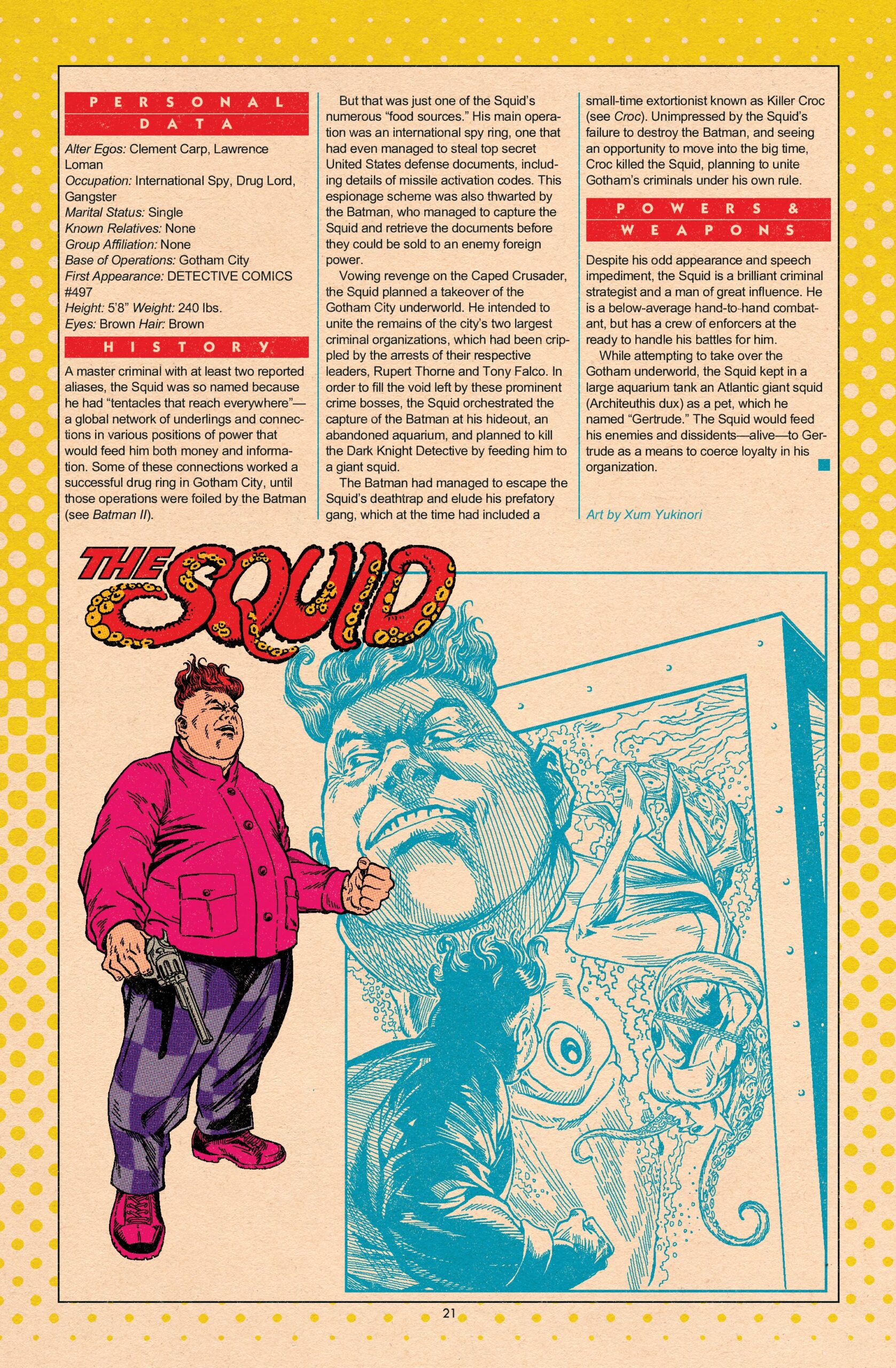
Isamu: The Squid was another missing character that was referenced in another Who’s Who entry (see Croc). Dad told me once that he thought the Squid was on the original list of S characters and was likely dropped when the editors realized they needed to free up pages needed for two-page entries like the two Supermen. And as much as Dad loved Don Newton’s artwork, this was one of those cases where he couldn’t find any comic book panels to work into a Who’s Who collage, so he drew the entry himself, and I think it turned out really cool.
Chris: Your Dad even included the “Where Are They Now” feature on the inside back cover, like every issue of Who’s Who!
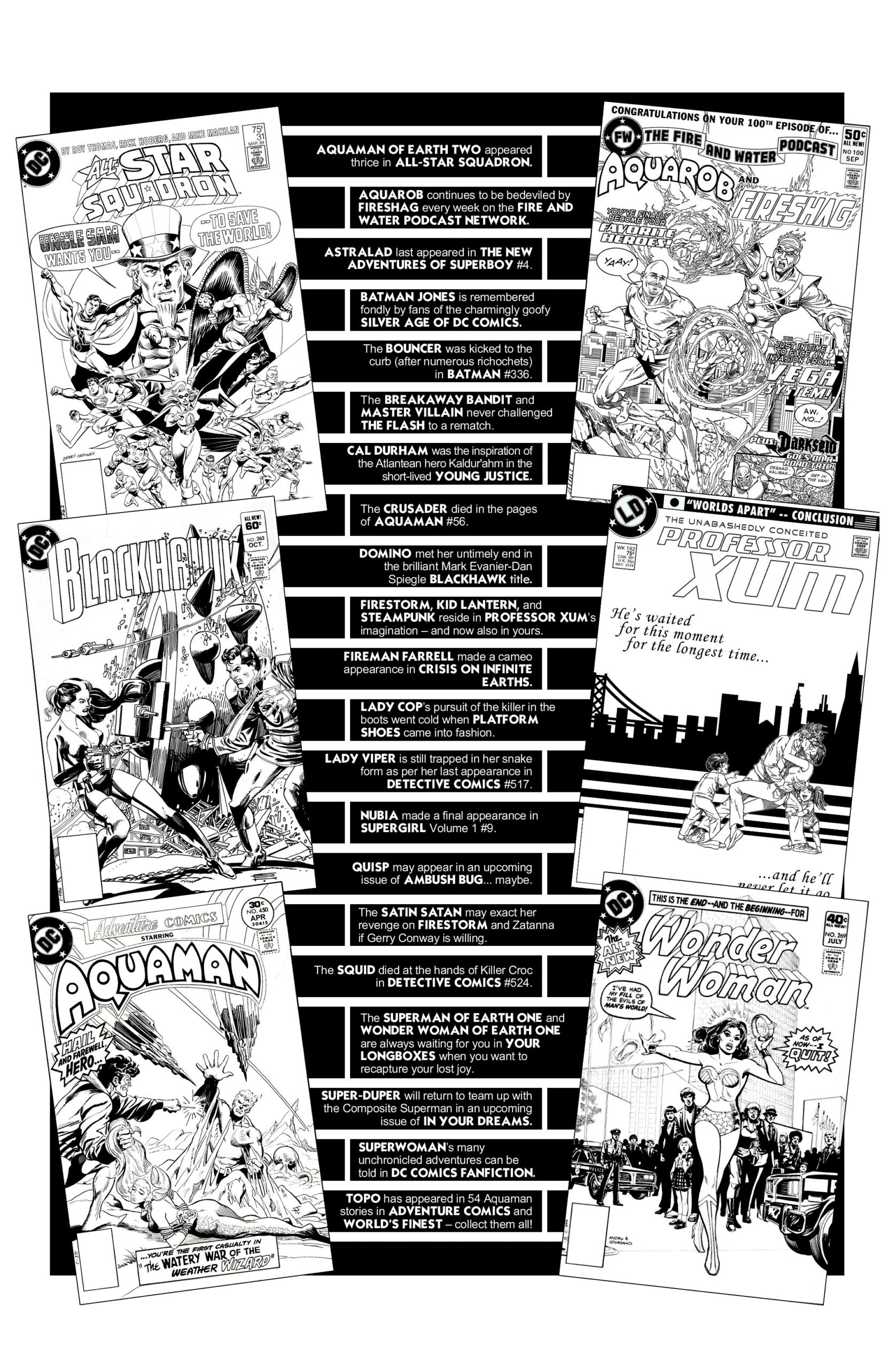
Namiko: That is so very Xum. He had super-strong attention to detail.
Isamu: Fortunately, Dad’s Photoshop file for the inside back cover was still intact, so it was relatively easy for me to do a “Save As” and create a version for Volume II. Dad actually wrote the blurbs for all of the Volume II entries he had written. I filled in the others as best I could, trying to match Dad’s writing style if not his humor.
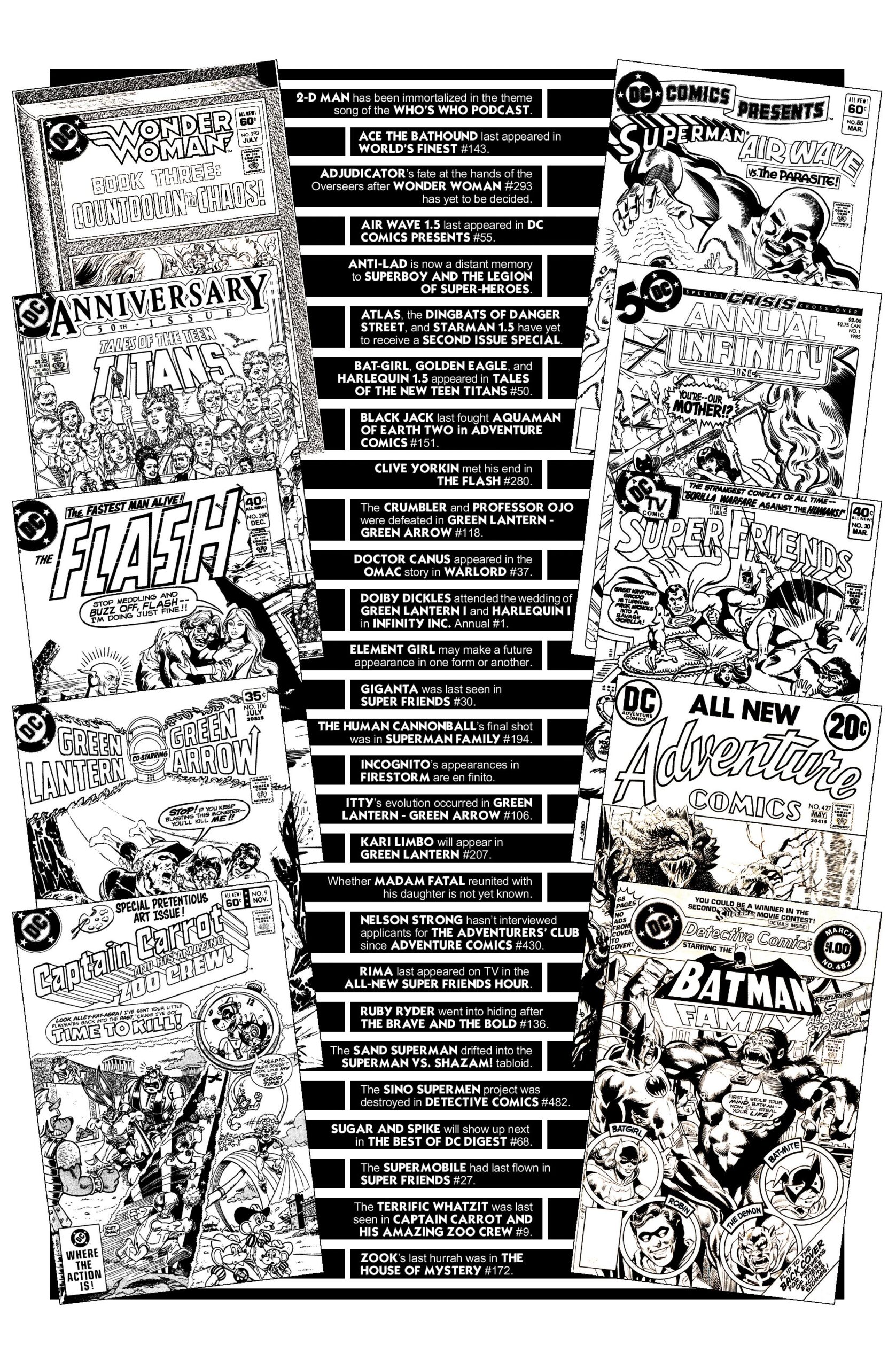
Chris: Isamu, I understand you created the cover for Volume II?
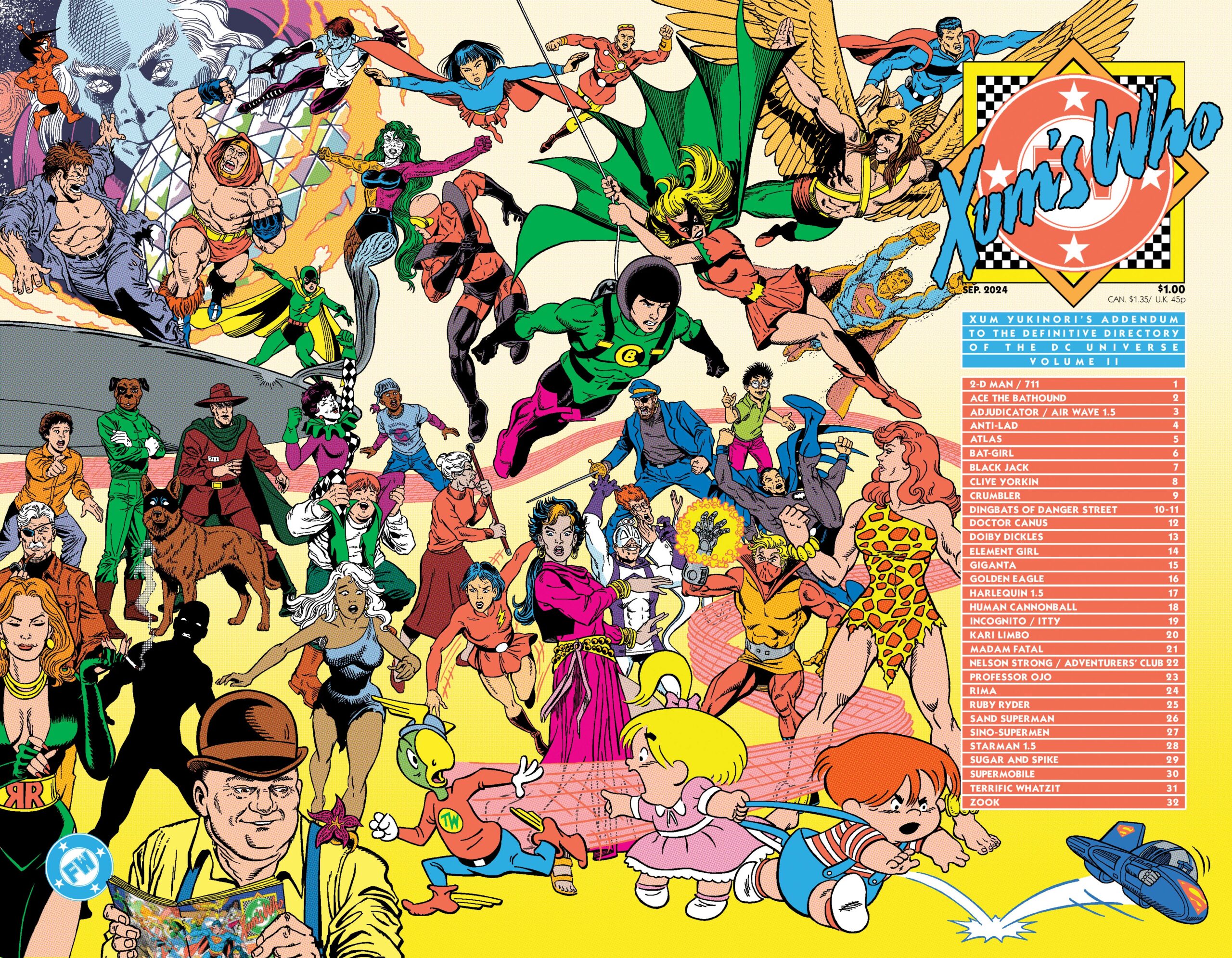
Isamu: Yes, and I honestly don’t know how Dad managed to do this before, or how George Pérez could do it month after month…
Namiko: It was quite an achievement. The most complex collage Isamu had ever done. He spent weeks going through Xum’s collection of George Pérez comics and artwork to find poses to use for almost every character. Sometimes taking the head from one and an arm from another and a leg from a third.
Isamu: I wanted to capture the style of the George Pérez covers, so it made sense to collage and digitally trace figures drawn by George Pérez. Sometimes I’d luck out and find the perfect figure for Anti-Lad and Element Girl, which was a Triathlon pose and a Captain Marvel pose from two different Avengers covers. A few times I was really lucky to find a George Pérez drawn Bat-Girl and Golden Eagle from a Teen Titans pinup that I could simply scan and touch up. And then there are times where I have an obscure character like the Human Cannonball, where I needed to take a Vision body, an Ultra Boy face, a Lord of Time helmet, an Adam Strange jetpack…
Namiko: How do you remember all of that?
Isamu: Well, anyway, the cover wasn’t all me. Mom helped me in places to make sure the redrawn hair and costumes on the traced poses looked right. She also had some good ideas of where to place some of the characters.
Namiko: That’s not even 5 percent of the work you put into it. This is pretty much all you.
Isamu: It is pretty much all George Pérez, really. Except for Sugar and Spike and the Terrific Whatzit – those came from Sheldon Mayer and Scott Shaw. I just pieced it all together.
Namiko: You put in the work. A collage is art. So are the collages you did for the Volume II entries.
Chris: Ace the Bat-Hound was initially created for another Fire and Water Podcast?
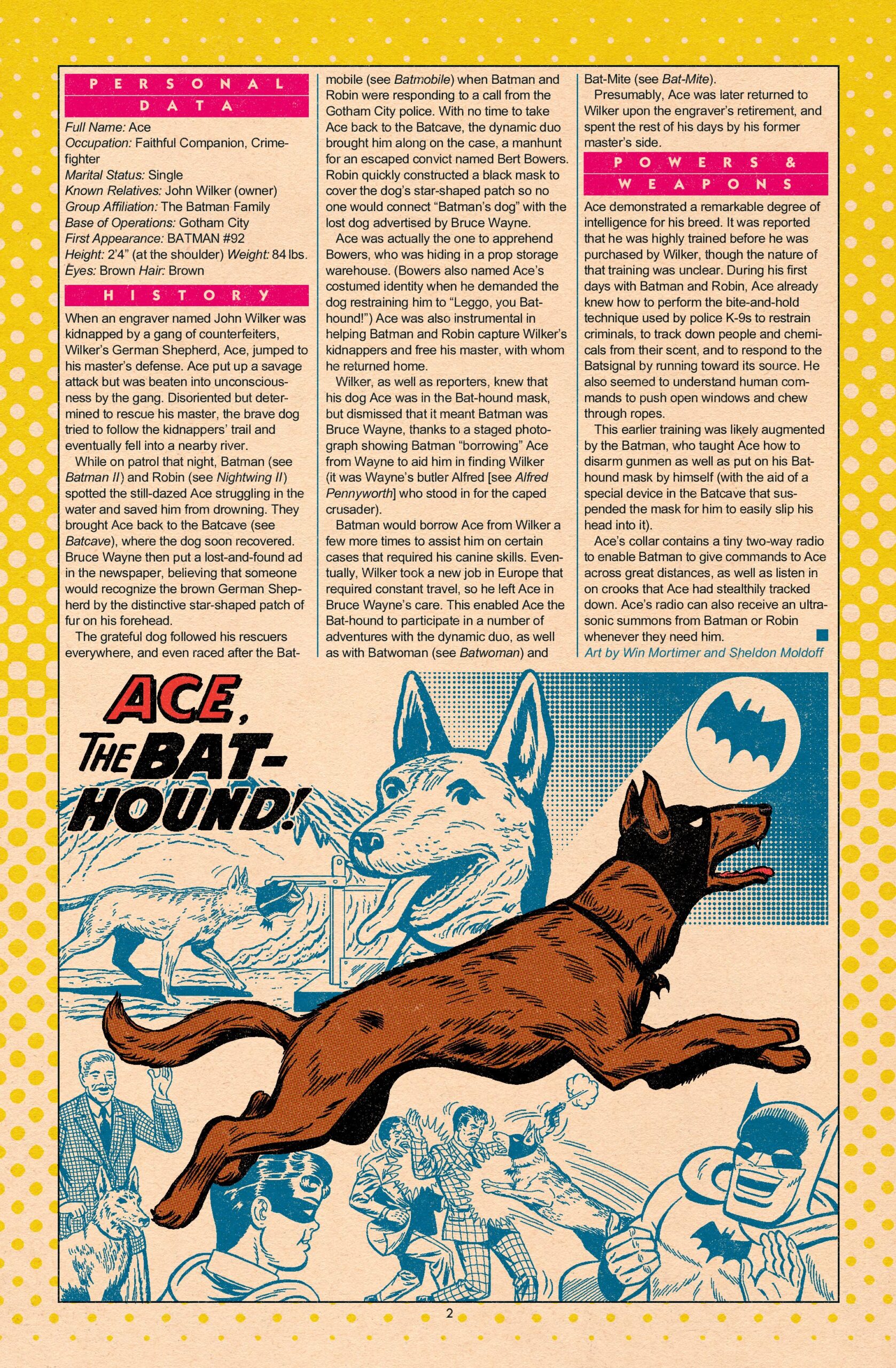
Isamu: Yeah, the Who’s Hot and Who’s Not Podcast by Uncle Siskoid and the “Hot Squad.” This was the first mock Who’s Who entry I put together, back in October 2021. It was in response to a comment that was read in the second episode by Ward Hill Terry. He was disappointed that Ace didn’t have an entry for the Hot Squad to review. And I realized that Dad had already written an Ace entry, and all of the Ace comic book appearances were in Dad’s collection, so I thought, “Hey, maybe I can create an Ace entry by tracing the artwork.” So, I did that in time for it to be reviewed in Who’s Hot and Who’s Not Episode 3.
I should say that going through those Ace stories to source the artwork was bonkers. One story was completely narrated by Ace, and he was talking directly to the reader. I was surprised Dad didn’t include Ace’s ability to break the fourth wall under his Powers & Weapons. But then, Black Hand’s entry didn’t mention it either…
But it was fun putting that Ace entry together. In honor of Dad’s birthday, the following year I collaged another entry he wrote.
Namiko: I think that’s when the “Xum’s Who bug” really bit him, because he was making entries at a steady pace after that.
Chris: Namiko, I believe the entry for the original Bat-Girl was a special one for you?
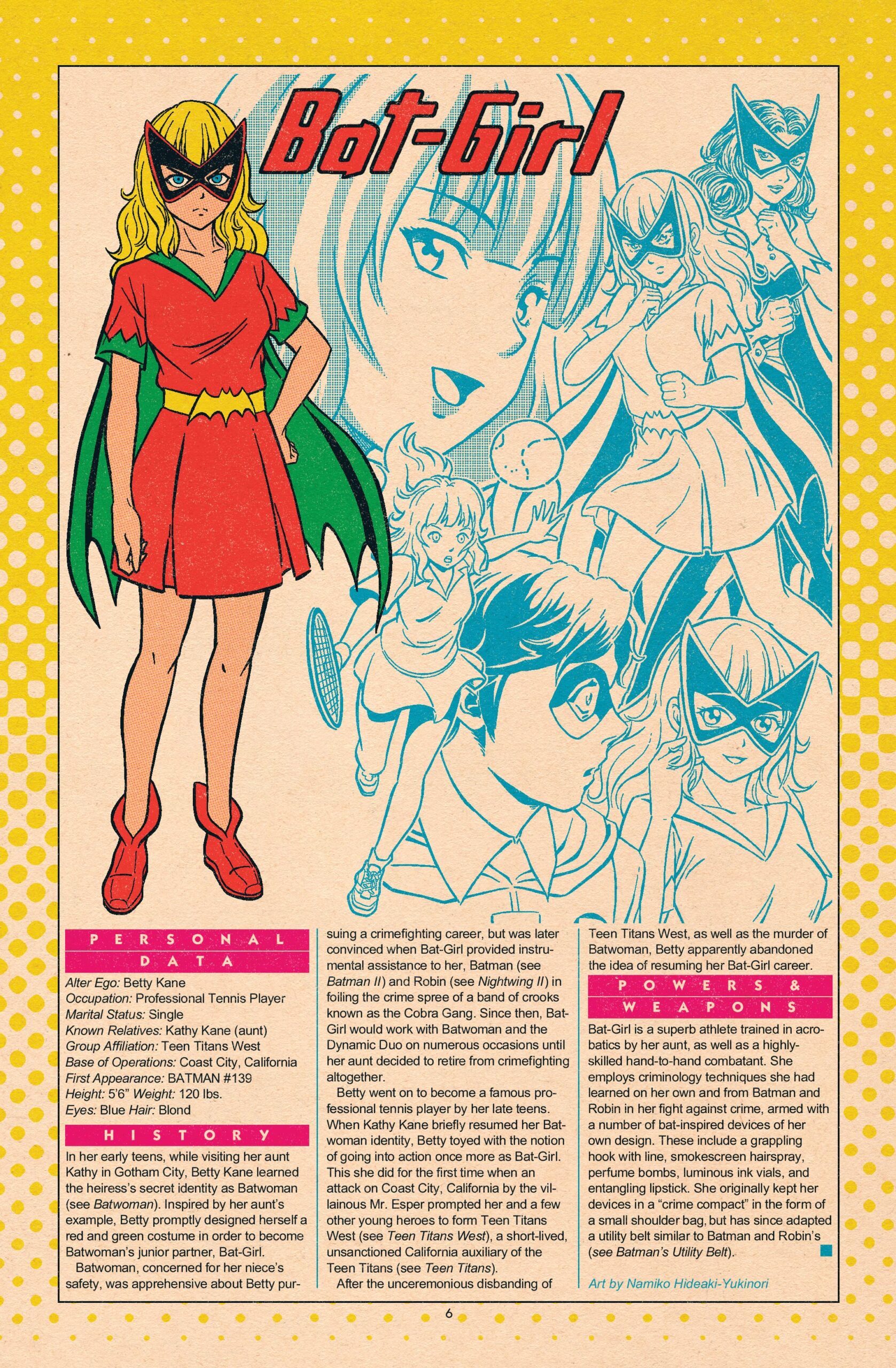
Namiko: Yes. It was the only entry that I illustrated in my cartoony art style, as opposed to inking over Xum’s pencils for 2-D Man or the comic art collages for Air Wave’s Mom and Zook. Isamu asked me to draw it because he didn’t have sufficient art from Bat-Girl’s 1970s appearances to make a decent collage. I originally thought to try aping Don Heck’s drawing style, like I did for the art style of the Terrific Whatzit comics when I drew that entry, but Isamu said I should just draw it the way I would normally do it, so there you go.
Isamu: It turned out great!
Namiko: I was worried it’d be a bit too anime…
Isamu: Anime is awesome! And Uncle Rob said it looked amazing.
Namiko: Well, if Rob Kelly liked it then I have nothing to worry about, do I?
Chris: Characters like Blackjack and Kari Limbo were drawn by Xum in his style. Was he able to finish them for publication?
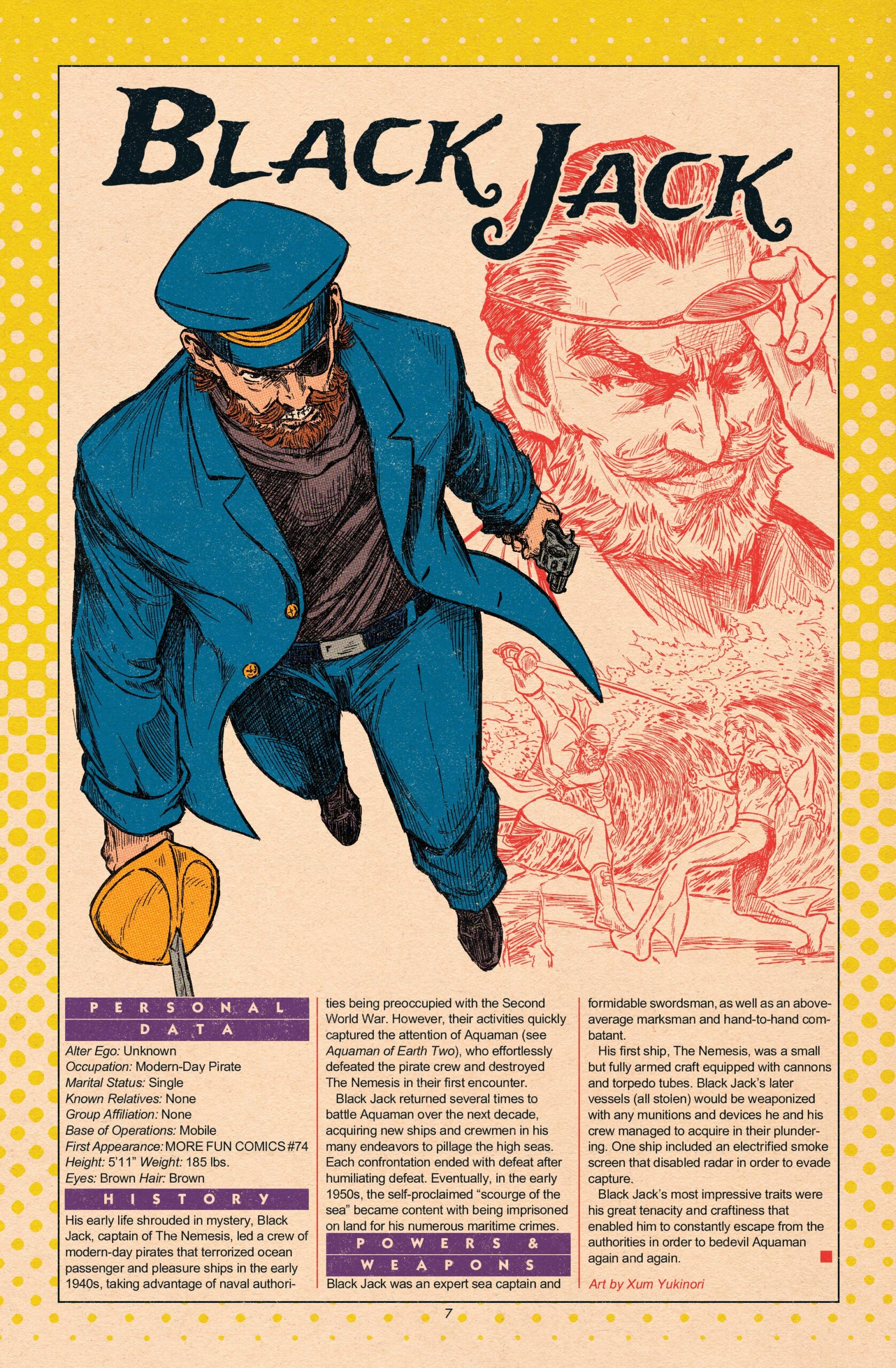
Namiko: Technically no, but actually yes, as it turned out. I came across Xum’s pencil drawings for these in a box of other papers and I wasn’t sure what they were. Fortunately, Isamu did. This was when Isamu was full speed ahead on making Volume II.
Isamu: I was surprised to see the pencil art, because I didn’t come across any Photoshop files that laid out Dad’s text for these entries in the templates, only the logos Dad created for them. Fortunately, Dad always drew the main figure and the surprint images as separate drawings, so he, and now I, had some flexibility to arrange them in the entry to fit whatever space the text allowed.
Namiko: You had to really clean them up though.
Isamu: Yeah, there were a lot of smudges from the papers sliding around in that box with all the house moves we did. And you didn’t want to ink them.
Namiko: The 2D-Man drawings I could handle, because your Dad drew them very simplistic since it was a half-size entry, but these full-size drawings for Blackjack and Limbo were so detailed. I looked at all of those little lines and I just… “No.”
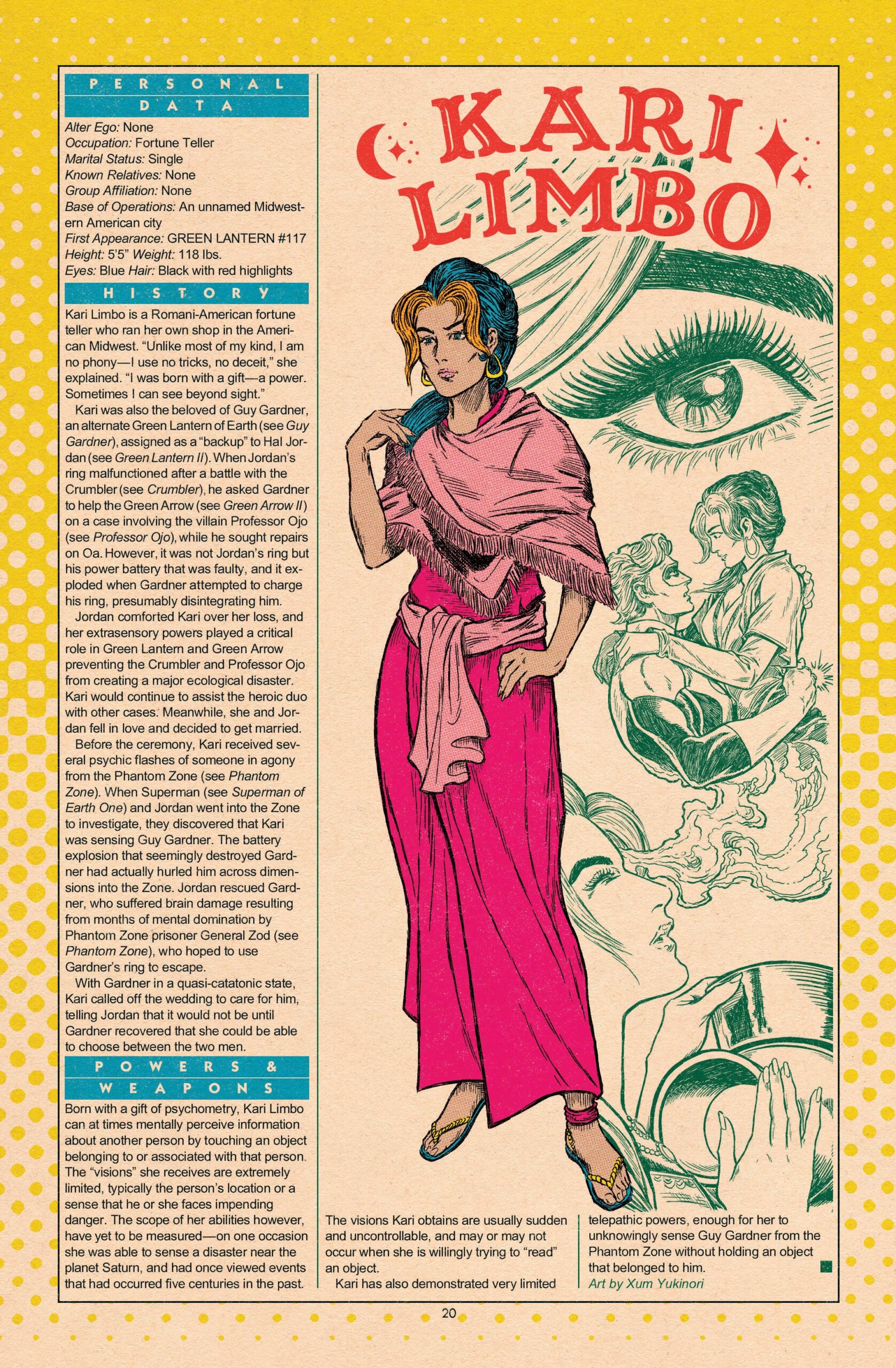
Isamu: I thought maybe we could just produce the entries straight from Dad’s pencils, darkening them up enough to print well, but that meant having to erase all of the smudges after I scanned the drawings in… especially around “all those little lines” …
Namiko: You did great.
Isamu: Thanks, but we really weren’t sure if it would work until we got the printer proof back, because what we see on the Wacom is not what we get on the printed page. We were pretty lucky. Especially with the Kari Limbo art, because the print quality of Dad’s old Green Lantern comics from that time were pretty bad. Those comics also had the Crumbler entry artwork, and I had such a hard time working from that. Why couldn’t those stories be available digitally?
Chris: Jack Kirby’s Dingbats of Danger Street from First Issue Special #6 gets a two-page spread! Tell me about the background on this one.
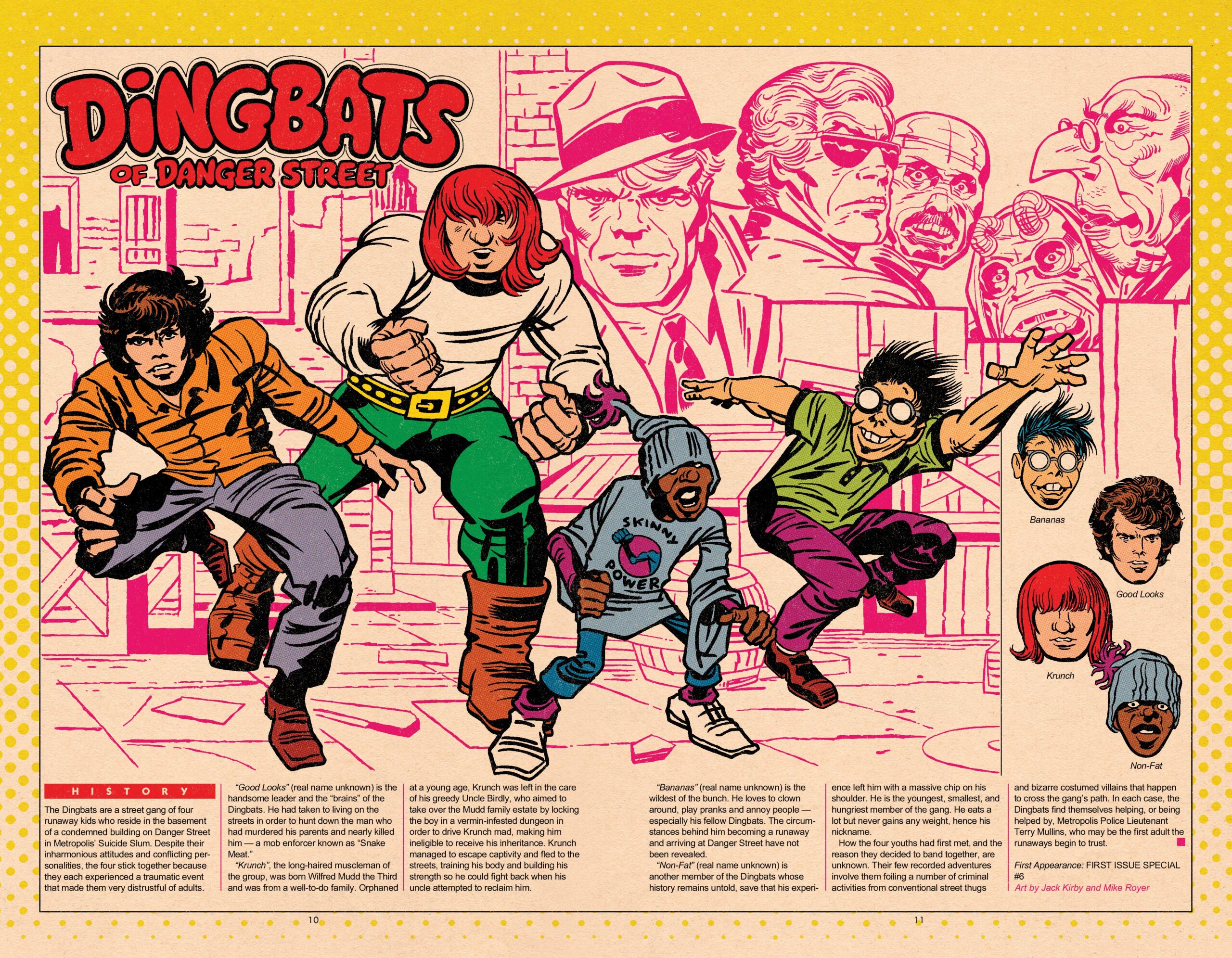
Isamu: Dad loved the Dingbats. I can’t tell you why. He just did. So, he wrote an entry on them, pulling information from that First Issue Special and anything he gleaned from any articles about the two additional Dingbat stories that Mr. Kirby had reportedly written and drawn. When I was doing an online search for Dingbat art to use for the entry, I found out about a book by TwoMorrows called Dingbat Love, which contained those two “lost” stories and they were completely finished – inked, colored and lettered from Mr. Kirby’s original pencil art. We ordered that book right away. The book came out in 2020, after Dad passed away, and I was amazed after reading the full stories to find that Dad’s entry as written was still completely accurate. I didn’t have to make any corrections or additions. And Dingbat Love provided all of the source art I needed to put the entry together.
Namiko: We essentially bought that book just so Isamu could make this entry.
Isamu: It was a good investment.
Chris: Giganta was such a glaring omission from the original Who’s Who. She was on Challenge of the Super Friends AND in the Legends of the Super Heroes live-action TV specials! But here you went with the Earth-One entry, and only mentioned the original Earth-Two version. Are there certain factors that help make these decisions?
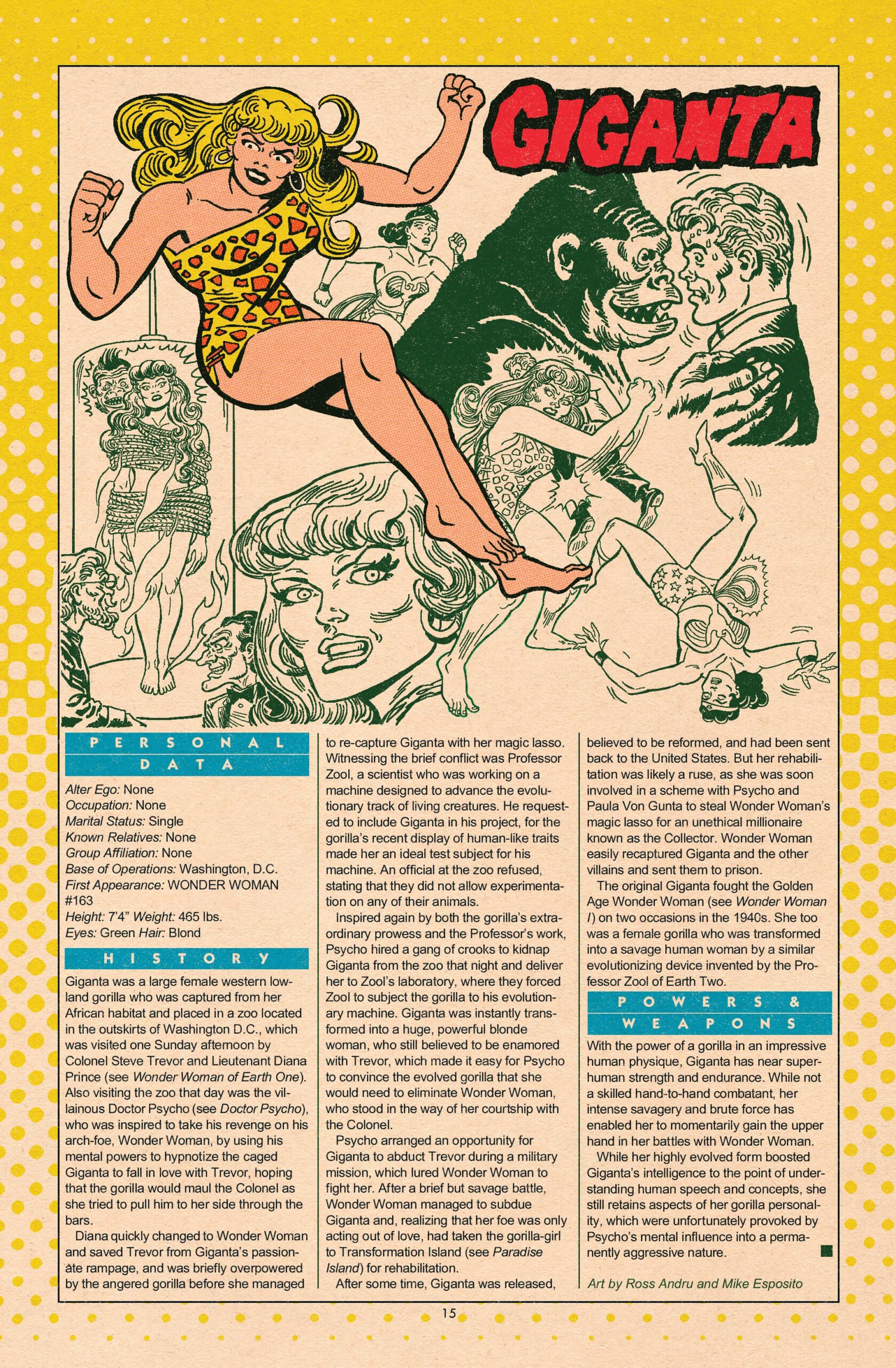
Isamu: Dad wrote the entry, so I can’t speak to every thought that went behind his decisions. But I know he did come up with a list of “rules” that he followed to make his entries look and read as if DC Comics did them as part of the original 1985-1987 Who’s Who series, at least the series before the Crisis on Infinite Earths changes entered into it. One of those rules was to use the comic book version of the character, even though he did agree that Giganta should have had an entry because of her appearances in other media. Another rule was to follow what Who’s Who did with entries like Batwoman and Doctor Psycho where parallel Earth versions of a character that are not that different should be combined into one entry. Those entries focused on the most recent version of the character, so he wrote Giganta based on the Silver Age Wonder Woman stories, which are where I pulled the art from.
In those stories, Giganta had blond hair, so that’s how I colored the entry. On the cover, though, I took “creative license” to give Giganta red hair, as well as add the bracelets on her ankles and wrists like she had on the Super Friends cartoon.
By the way, Dad wrote an entry for Rima the Jungle Girl for the same reason as Giganta, namely her appearance on the Super Friends. But again, the entry followed Dad’s rules and focused on her story as it was adapted in the DC Comics.
Chris: Madam Fatal was written by Fire and Water’s Michael Siskoid Albert, and Nelson Strong from The Adventurer’s Club was written by F&W co-founder Rob Kelly. Tell me a little more about how those came about.
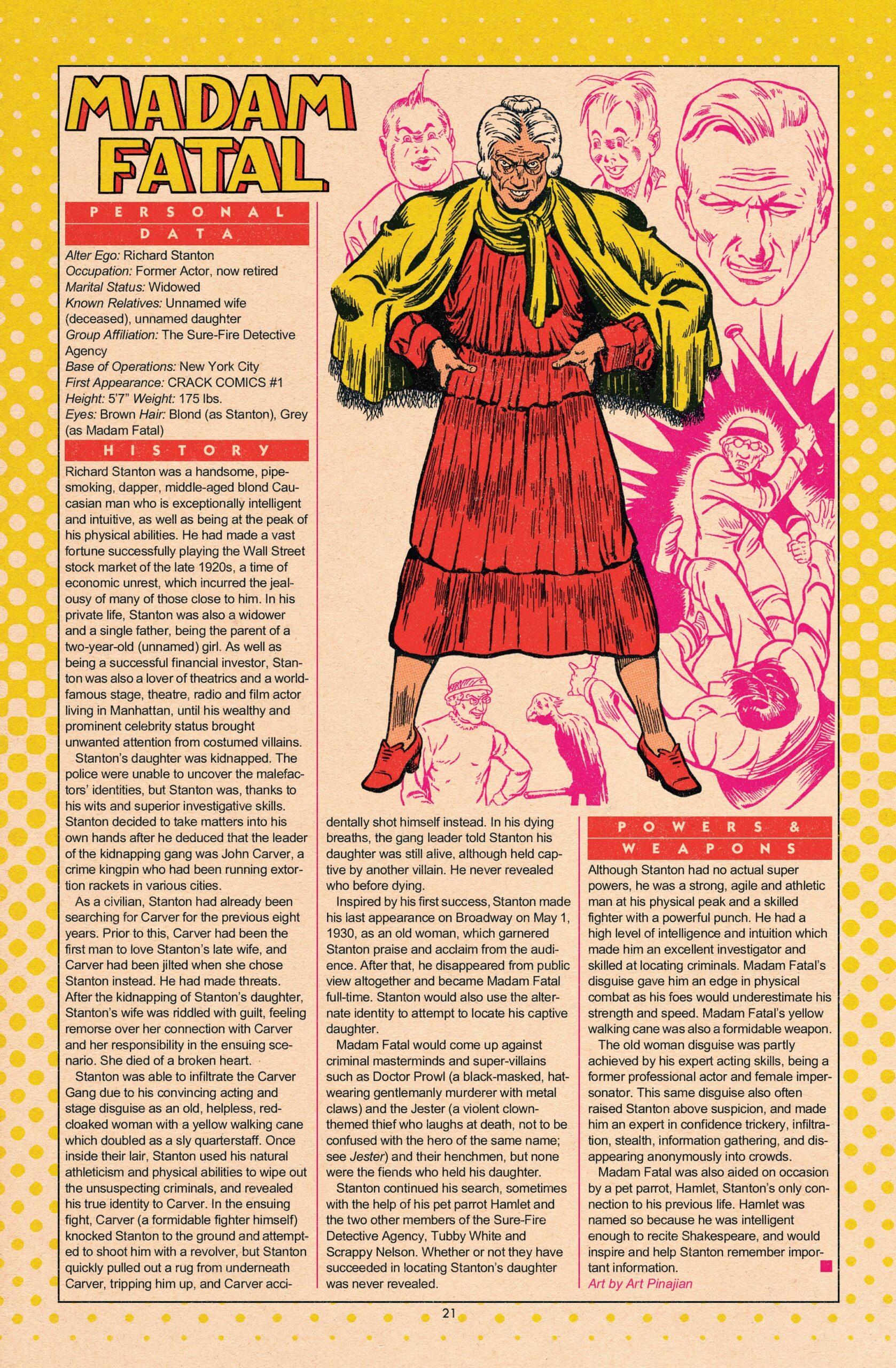
Isamu: Uncle Rob and Uncle Siskoid would have to tell you why they picked those particular characters, but Dad did share his Xum’s Who template with his fellow podcasters so they can make their own entries. And since they used Dad’s template, it seemed right to include their entries in Xum’s Who as well. However, the images they used were in too low of a resolution to print, so I redid the entries with digitally traced art, keeping most of their original writing.
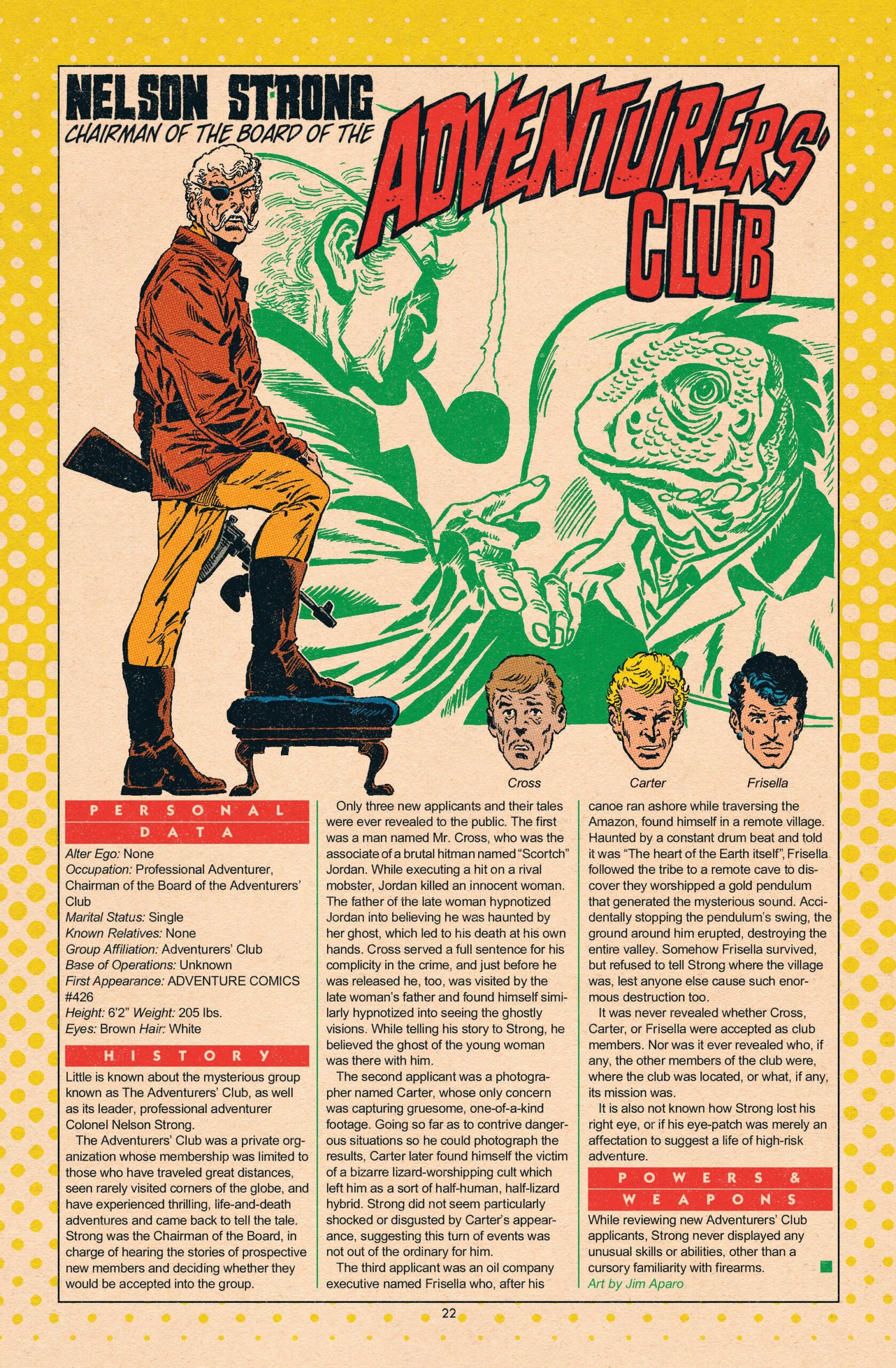
I said “most” because of another one of Dad’s rules to make the Xum’s Who entries faithful to the original Who’s Who series, which was to have the character history be strictly pre-Crisis DC, or at least as published before the post-Crisis began with John Byrne’s The Man of Steel series. Uncle Rob’s and Uncle Siskoid’s entries covered DC Comics appearances published in the 1990s and the 2000s, which I had to edit out. If I get around to making a “loose-leaf” version of these entries, or perhaps a “Secret Files and Origins” page in Madam Fatal’s case, I can put all of that later history back in.
Chris: The Sino-Supermen was your first solo entry, Isamu?
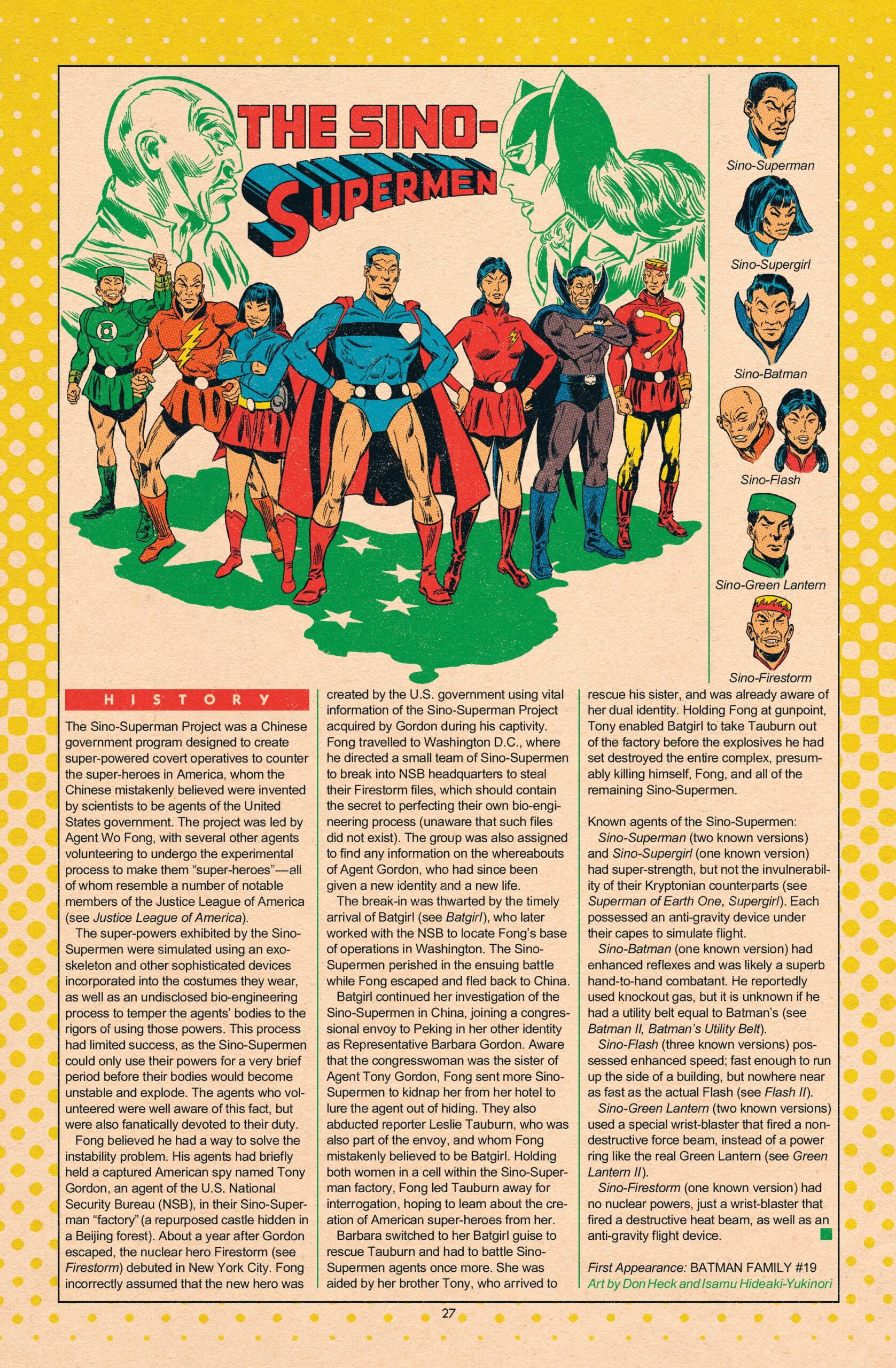
Isamu: The first one where I did the writing as well as put together the art, yeah. This was inspired by a 1978 comic panel I saw on Twitter a couple of years ago that mentioned Firestorm, believe it or not, in a context that made me want to read the full comic book story. Turns out, it was from a Batgirl story which featured the Sino-Supermen, and after reading it through I suddenly felt like creating an entry for them, despite the very dated stereotypes. It was a little tricky because I had to repurpose Don Heck artwork of other characters from other stories to recreate the Sino-Supermen that showed up in the Batgirl story chapters that Don Heck did not draw. This entry was essentially a tryout for what I would later do to make the Volume II cover I suppose, though I didn’t know it at the time.
Chris: I’d be remiss if I didn’t mention a missing entry asked about during Who’s Who’s original run; Sheldon Mayer’s Sugar and Spike.
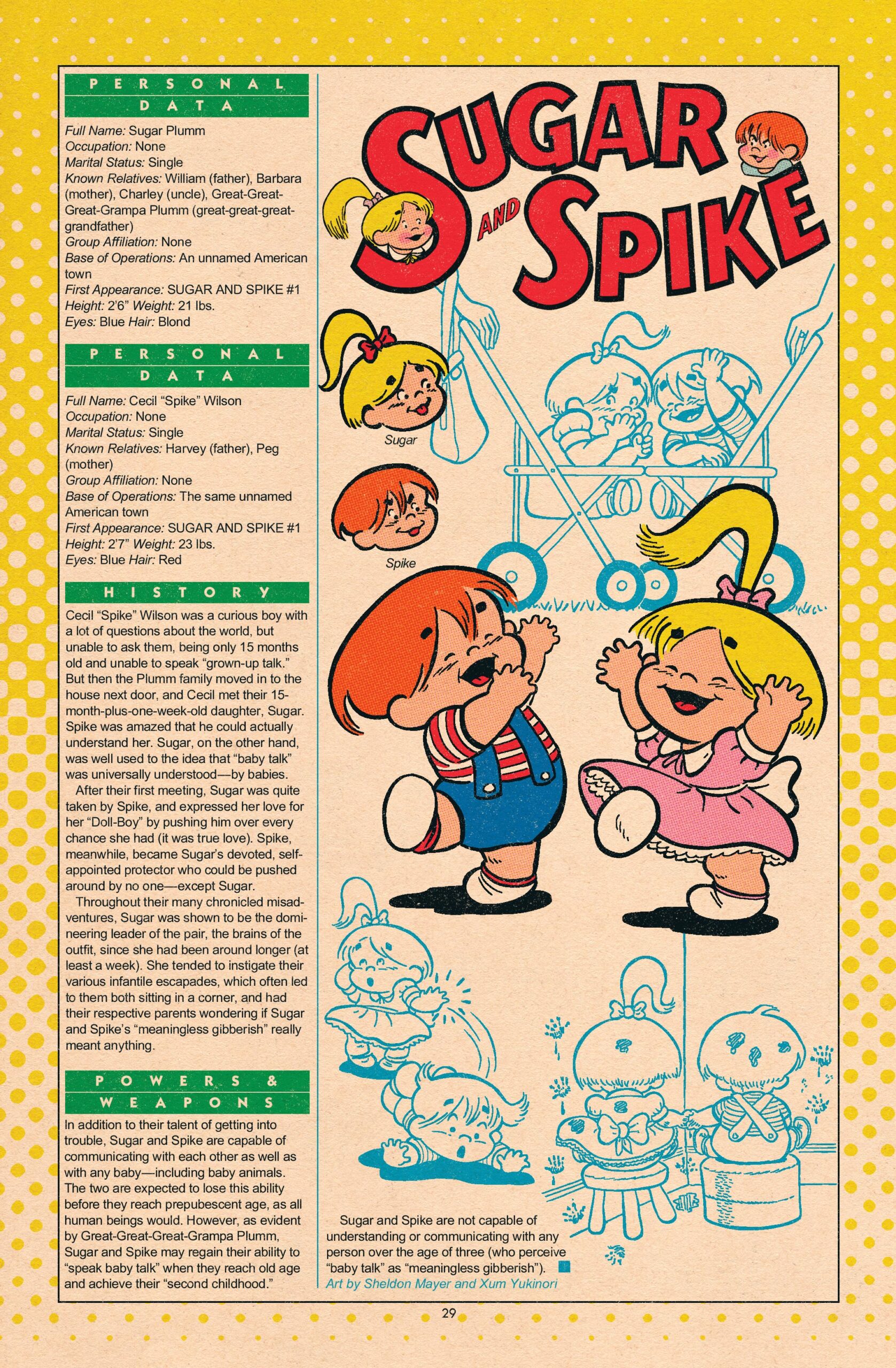
Namiko: Sugar and Spike was a comic book series Xum adored. He shared it with me shortly after he and I got together, and he had a greater appreciation for the series then because he essentially became the stepfather of an infant, Isamu, at that time. In fact, that comic convinced Xum and I that Isamu and Aika had their own “baby talk” language before they were 2. I’m also sure that Xum was one of those DC readers in 1986 who felt that Sugar and Spike should have been included in the original run of Who’s Who.
Isamu: I’m pretty sure that Sugar and Spike was the first entry Dad put on his Volume II list. He told me once that he didn’t include them in Volume I because he had already made the Steampunk and Super-Duper entries by the time he was building the cover, and putting Sugar and Spike in meant taking one of those entries out, otherwise it would have messed up the two-page spreads for Superman, his Fortress, and Wonder Woman.
Namiko: Xum was too practical to set aside an already completed page in favor of an unstarted one, no matter how much he loved the characters.
Isamu: This was one of the first Volume II entries Dad finished, with his digital inks over scans of Sheldon Mayer’s pencil art published in numerous TwoMorrows magazines.
Chris: As a huge fan of the Jay Garrick Flash and the Zoo Crew, I was very happy to see the Terrific Whatzit get his due. Was this a fun piece for you to create, Namiko?
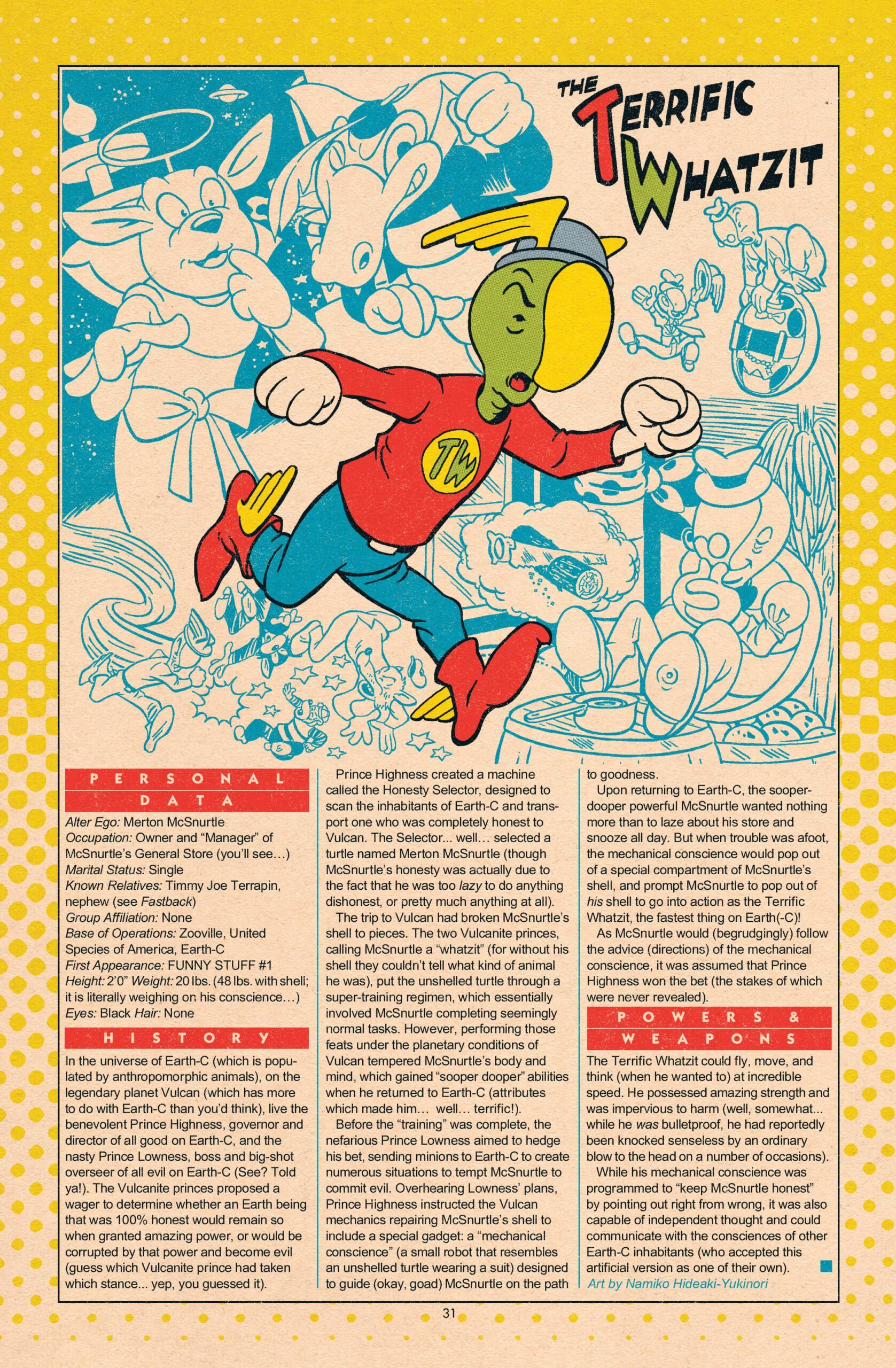
Namiko: I’m glad to hear it, and yes, it was fun, and I had a lot of good source material to work with. In fact, I found myself swiping Funny Stuff comic panels for some of the surprint illustrations because I couldn’t top what that artist did. So, I tried to ape that artist’s style when I drew the main figure and the rest of the artwork.
Chris: Can we expect a Volume III? And if so, may I request the Swashbuckler, one-time Batman partner and Vigilante’s nephew from Detective Comics #493?
Isamu: As I said, there are a number of entries Dad wrote that didn’t make it into Volume II, many I have mentioned earlier. I also have a short list of characters I want to do too. I hope to do a Volume III, IV, and beyond. Even if I finish up all of Dad’s written entries in the next volume, the book will continue to be called Xum’s Who in honor of Dad and his love for DC Comics characters and the original Who’s Who series.
You are not the first person to suggest the Swashbuckler, so yes, he is on my list. But I’m not sure if there are enough comic book panels available to collage. Mom…?
Namiko: I wouldn’t be surprised if all of your tracing leads to you developing your own art style so you can draw that entry yourself.
Isamu: Is that a “no” then?
Namiko: We’ll have to wait and see. And “wait” is the operative word. It had taken Xum seven years to put the first volume together, and while Isamu compiled Volume II in about three years, that was before he became a full-time college student. He’s also working on a number of other creative writing projects of his own. So, while you can be sure to expect a Volume III, you should not expect it anytime soon.
Chris: Thank you both for your time. Is there a way readers here at 13th Dimension can check out Xum’s Who?
Isamu: While Xum’s Who had a limited private printing, free digital copies will be available to the public later this year. To find out more, email xumswho@gmail.com.
—
MORE
— Dig These 13 Gorgeous DC WHO’S WHO Pages, by Robert Greenberger. Click here.
— Dig 13 MORE Gorgeous DC WHO’S WHO Pages, by Robert Greenberger. Click here.
— 13 ARTISTS I Wish We’d Included In DC’s WHO’s WHO, by Robert Greenberger. Click here.
— 13 CHARACTERS I Wish We Included in DC’s WHO’S WHO, by Robert Greenberger. Click here.
—
13th Dimension contributor Chris Franklin is a graphic designer, illustrator, writer, and podcaster, who co-hosts and produces several shows on the Fire and Water Podcast Network, including JLUCast.

November 27, 2024
I adore Xum’s Who! Both volumes are fantastic! And I’d love to see three new entries! Captain Thunder form Superman #276! The Superman-Batman Revenge Squad from World’s Finest Comics #175! And, of course, a new Earth-Two Robin entry with Robin in his Batman-inspired duds from Justice League of America #55!
And Chris! Thanks for writing up this awesome interview with Namiko and Isamu! And my many thanks to Adrian! Great work!
November 27, 2024
Thank you, Xum Yukinori and team, for helping to fill in the blanks that DC Comics missed in their “Who’s Who” series.
November 27, 2024
I had read Xum’s entries on “The Line it is drawn” over the years. He was a very talented artist. I will have to look into the Xum ’52.
November 27, 2024
Hey there. Xum’s Who project is sole inspiration for my own Who’s Who entries on Facebook (entry #11 hopefully coming this weekend) and the yardstick to measure all fan-derived efforts against. Love to read about him and the secret origins of the volumes. If there is ever a Volume III (or beyond) I gladly donate my entries to the cause.
Created so far:
Astra, Girl of the Future
Lady Danger
Doctor Pat
Windy and Willy
Captain Thunder
Interplanetary Insurance, Inc.
Manhunter 2070
Barry of Bleeker Street
Lesla-Lar
The Cat
November 28, 2024
Glad to see another fan of Lady Danger. I would’ve loved to have seen a Darwyn Cooke version of Lady Danger!
December 11, 2024
¿Dónde se puede ver su trabajo?